“Should I Stay or Should I Go? ”
The Clash
I hit the ground all right. Not running but barely able to crawl. No soft landing. This had to be for real- ‘It’. Shivering on the brink of the Great Gaping Beyond, just short of too late, as close as you can without getting sucked in completely.
Warding off the overwhelming plunge into free fall. A one way trip towards shutdown. It didn’t look like there was any coming up. Hanging in the balance, within an inch, fully aware of the choice, determined to stay, I clawed my way out of the throes back to dear life-just. It was very near, very near indeed. And very tough on my nails.
Set upon in my own kitchen, the attack that morning was the mother of a weird sensation – being sucked into the ultimate vortex. Not waving but drowning, my left hand was writhing surreally around by itself as if it didn’t belong to me. Dragging myself like grim death across the dining room floor, I had to raise the alarm without unduly worrying Leonor. Tapping on the bottom of the wall groggily, I roused Ruben who like the rest of my family, was still slumbering away. Swinging into action- ready, steady go- my two young adult sons, Sean and Ruben lugged me gasping to the car and whisked me away to Balmain hospital. Their rapid response and presence of mind was of the essence.
Code Blue.
Out for the count in this hardluck round, what happened after that is all rather hazy. In the nick of time, out like a light, dead to the world, I was transferred by ambulance to the larger Royal Prince Alfred Hospital, better equipped for such an emergency.
Not a moment too soon medical things started kicking into place. I had reached the bright lights, not the ones I had in mind, more like the spotlights in which a doomed kangaroo is frozen. Not on the way up, rather on the way out- but with at least signs of life. Elated to be in the here and now, not the ever after. Stabilised, living to fight another day. My family had gathered around me, not knowing if they were waiting to farewell me or come face to face with an unknown future. At the edge of darkness, my lights were on but there was nobody home. After slipping in and out of semi-consciousness, I came to, pale and drawn, laid up in a hospital bed all dopey like a stunned mullet. I had stepped through the looking glass and things didn’t look good. It felt like part of me had gone but I was still here. Would I ever be me again? All my natural functions had to be artificially assisted and I appeared just as helpless as one could possibly be and live. A blur of heads floating into view, peered down at me, testing me: ’Squeeze my hand if you can hear me,’ I was asked. ’Eyes wide open now! Following the light of the pen torch as it traced a path across my view ruled out any damage to my sight:’ You’ll be all right,’ I remember vaguely being reassured as I awoke.
Uh oh- it was ruder than that. And righter. Getting my left leg and arm moving was another story. Moreover, locating the spot where they were pricked proved disturbingly difficult. In a bad way, delivered a king haymaker, my body had sure gone haywire.
Kitted out in one of those hospital gowns that tie at the back, I appreciated the attention I received.
Whenever I was about to sleep someone would come in to check my blood pressure, my pulse, my resurrection beat. They took my temperature, more blood and monitored whatever else was playing out in the gates and alleys of my body.
I wasn’t alone in what I was starting to go through. Every ten minutes in Australia someone bites the dust this way. This scene in all its horror I learned was unfolding time and time again before others around the world. All at once I was on the list.
I can see myself to a T in Gordon Yates, Australian WWII veteran, crawling desperately across the floor to get help. Likewise in Walter Koontz, New York cop, whose symptoms mirror my own closely. Walter was cut down after being disturbed by screaming and gunshots in his seamy bedraggled tenement block. I saw it hit mafioso Carmine Lupertazzi during his luncheon beside the golf course. Keeling over, totally whacked, never managing to finish his egg salad. What a waste. Arrivederci Carmine.
I can see myself in Logan Roy, collapsing in his helicopter before diverting to a hospital. His progeny had just refused his plans for the family business.
I saw Bill Mitchell caught out in delicto flagrante. He was left in a persistent vegetative state, as was Adam Trask, Californian lettuce farmer.
I saw Elaine Benes’ older writer boyfriend, Owen March unconscious on Jerry Seinfeld’s couch after he had started twitching outside Jerry’s building.
I saw Lois Granger sprawled on the pavement of her town in Maine. Stone cold dead. Both she and her coffee had taken a spill after leaving the doughnut shop. She had seemed just fine to witnesses. Then she walked out and crumbled.
I saw Henry Kitteridge carrying a bag of mulch mix across his garden before he too crumbles. Surviving a few years, his sight gone, unable to talk much or do anything before adding himself to the mix.
Also struck in his garden I saw Knut Hamsun After chopping wood he collapsed and lay in the snow, believing his time has come. After consulting his pocket watch which drops to his side, we are invited to contemplate the watch until a fresh flurry of snow revived him at which point he staggered up and went indoors.
I saw all the details as it happened to Tom Beaumont in his garden watering his lawn. Tom moved the hose over a bush and got a kink in it. Water stopped coming out of the nozzle and there was a loud hissing noise of water under pressure. As the water leaked at the other end of the hose, connected to the side of the house, Tom went around the bush and was undoing the kink when suddenly he twisted and squirmed, grabbed his neck and doubled over, falling to the ground. Unconscious, continuing to grasp onto the hose, he became a macabre fountain, water shooting crazily onto the driveway and his car. The attack left Swedish actor Oskar Ekdahl without a ghost of a chance. His immediate comment was that the role of wraith in his current play was now his. Sam Shepard’s character, the patriarch Robert Rayburn from the television series Bloodline, has his own bloodflow block up to follow a different line. Just to be different his fatal attack leads to him plunging from his kayak into the water.
Like myself Rose Siverman was drinking a cup of tea when it struck. Peeking through her window she had a seizure spying a white neighbour pashing a coloured man. She was still grasping the cup when the ambulance gurneyed her out of her abode, stiff as a board.
We witness Alain Wapler, the high powered CEO of a major car manufacturer wake up one morning with a numbness in his right arm, after which he passes out. A little while later he passes out a second time — at which point his chauffeur rushes him to the hospital and we learn he’s had two major strokes.
We can see Winston Churchill in the midst of delivering a speech when the great orator starts fumbling for words before slumping to his seat. The seriousness of his condition was downplayed and put down to physical exhaustion. Harold Macmillan, one of his ministers, commented on his appearance the following day: “I certainly noticed nothing beyond the fact that he was very white. He spoke little, but quite distinctly.” By the time the 78 year old PM was assisted into his country home, his left foot dragging along the ground, it was discovered that he had suffered a far more serious impairment. After losing consciousness this time, he came round, his face drooping, his eyes bleary, with very little sensation on his left flank , his speech severely impaired and his heart weakened. He and his inner circle conspired to hide this from the public.
Going back to 1932 we watch John Guthrie go down, coiling onto the floor and clawing at the mud, his body straining into an arch. He’s left bedridden and declines rapidly.
Carlo Castillo has his before falling down a flight of stairs. We see Leonard Matthews, in his eighties, paralysed and comatose in his hospital bed.
No strangers to death defying acts, past experience had taught most of our thirteen first-hand never to rule out the chance of attack from without. What rocked us most in our common fate was that on this occasion the body blow wasn’t the work of any sinister or accidental agency. It was an inside job. Not just Lupertazzi, we thirteen, Gordon, Walter, Bill, Tom, Henry, Knut, Oskar, Robert, Alain, Guthrie, Carlo, Phillipe and real life me all shared an inherent vice. We had suffered brain attack. Severe stroke.
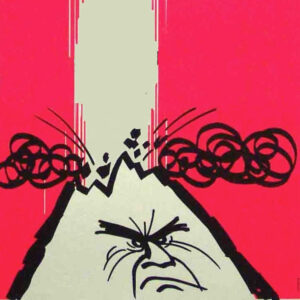
Most likely you have seen at least one of these onslaughts. Cinematic re-enactment has driven home to viewers just how profoundly frightening they are. Gordon Yates is the leading character in the ABC drama series ‘Changi’. Walter Koontz was played by Robert De Niro in the movie ‘Flawless’. Lupertazzi was grazing with with fellow mafioso Tony Soprano at the golf course restaurant. Logan Roy played by Brian Cox is the media mogul in the series ‘Succession’. Tom Beaumont was the hardware store owner the camera begins to settles in on at the beginning of ‘Blue Velvet’. Bill Mitchell was the American President played by Kevin Kline in the comedy drama ‘Dave’. Looking down on him his first lady must have been thinking, ‘Why don’t you slip into something more comfortable… Like a coma. Diplomacy down the drain, she responded just as tartly, ‘Why can’t you die from a stroke like everyone else?’
Elaine Benes is hardly more subtle. She breaks up with Owen March while he is in the hospital, unable to speak and having to be spoon fed. ‘I have a wonderful time when I’m with you,[Owen] wonderful! But at this point in my life, I’m not really sure that I’m ready to make a commitment to one person. I’m just not really sure that we have enough in common. For example, I like running in the park, bicycling, roller skating, tennis and skiing, and um, well , I’m gonna be brutally honest with you now, Owen, it’s a bitch to get here.
It’s two subways. I have to transfer at Forty-second Street to take the double-R. Anyway, I mean, this doesn’t mean we can’t be friends.’
Adam Trask, played by Raymond Massey, in the Cain and Abel allegory ‘East of Eden’ was flattened following a dust-up with the son he neglects, played by James Dean, and the death of his favoured son.
Henry Kitteridge, played by Richard Jenkins, was the pharmacist in the TV series named after his wife, olive who spent his days serving the locals in his Maine town One day he witnessed first hand what can happen when blood pressure can rise dramatically. After sorting out pills to control it, henry Kitteridge rushes out of his pharmacy to try and revive Lois Granger. Little could Henry realise that sooner than later he would suffer a similar fate.
Hamsun was the Norwegian writer played by Max von Sydow in the eponymous film.
Oskar Ekdahl was the thespian poppa of Ingmar Bergman’s alter ego in ‘Fanny and Alexander’.
The stroke depicted by Isabelle Huppert in Abuse of Weakness is so convincing, one critic wondered if it was real. Isabelle had had some experience in this area. Two of her mothers had had one. The ones portrayed in her films, Amour and Elle.
In her role as The Godmother she recalls her late husband’s stroke. His head falling flat onto his dinner plate, he never managed to finish his Caesar salad.
Rose Silverman is one of the colourful characters in Wood Allen’s ‘Everything You Wanted To Know About Sex.’
Alain, the main focus of the French movie ‘A Man in a Hurry’ loses his capacity for speech. Damage to his brain left him without the ability to communicate coherently, When this CEO, whose story is based on that of the former head of Peugeot, opens his mouth, only nonsense comes out. He knows what he wants to say but no longer knows how to say it. When he tries, he instead speaks a jumble of related words – most homonyms – that see him ridiculed by strangers, and which costs him his lucrative and powerful job. So instead of saying ‘boat’ he’ll say “goat.’ Or he’ll say ‘bonjour’ rather than ‘au revoir.’ He scrambles every single line, replacing words with similar sounding ones, in many cases pronouncing words backwards in the ‘verlan’ slang that’s been popular in the French banlieue and elsewhere since the 1980s.
Churchill’s strokes are re-enacted in the biographical drama ‘Churchill’s Secret’. The film charts the course of Churchill’s (played by Michael Gambon) remarkable recovery with the help of his spirited nurse [fictitiously portrayed] .
John Guthrie, played by Peter Mullan, is the squinty eyed, abusive, Scottish farmer in ‘Sunset Song’.
Carlo Castillo is one of the main characters in the series ‘Why Women Kill’. His stroke was brought on from hearing his wife is cheating on him.
Leonard Matthews, the grandfather of Erin, the main character in the series, ‘The Promise’, is a former soldier in the 6th Airborne Division in British Mandate Palestine.
Philippe Haubin, a robust French speaking worker on a remote Scottish island, has had a previous stroke which leaves him with amnesia in the film ‘Nobody has to know’.
It seems the French and Scots filmakers are competing to be the best at simulating the effects of a stroke.
Unlike the seizures of Walter, Adam, Robert, Alain, Logan, Guthrie, Carlo and Gordon whose blood is boiling after his mercenary son’s selfish financial demands on him, someone who had spent time crawling through suffocating stagnant swamp infested by Japanese troops, mine was not triggered by any apparent rush of blood. Like that of Lupertazzi, Beaumont, Kitteridge and Robert Evans, the larger than life Hollywood film producer, it just came out of nowhere.
Tora! Tora, Tora! It could happen to- someone just like you.
Blowout
A blood vessel on the right side of my brain had burst wide open. Like Tom Beaumont’s hose it had been under great pressure. This led to bleeding and swelling within and reduction of the blood supply flowing to part of the brain downstream, and damage to the immediate area.
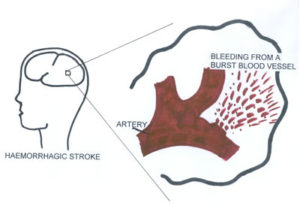
‘You’ve had a haemorrhagic stroke’, said the neurologist socking it to me. Of such neurological events –called by the ancient Greeks apoplexia- it is one of the more all conquering, notoriously severe. It kills a lot more chaps, in fact, than were bumped off when Troy was sacked.
It wasn’t singularly painful when it happened or in the fog immediately afterwards. At that stage, it was all Greek to me. It was only gradually that my worst fears were realized, that the chilling sickening truth sank in. Like a ton of bricks. I was ‘all right’ all right- my left side seized up, communication of signals along nerve cells lost, knocked out of commission, out of alignment. My left leg wouldn’t budge, my toes wouldn’t twitch-I was crippled, washed out, knackered, fighting for my independence and inner peace. I felt like rolling myself up in a big ball and for the ground to swallow me up.
The problem wasn’t in my left side, that’s just where it had manifested itself. Reeling under the shock, I faced a downward turn better conveyed, not to put too fine a point on it, by the depth laden import – catastrophe. Those Greeks aren’t too bad with words, are they. Credit where credit’s due. Or do I sound like I’m Con descending?
Well Strike me pink! Shiver me timbers! That’s torn it! I had really blown it this time. Blown my top. Blown my ability to work. Blown my prospects. The whole shebang. To smithereens.
Warts and All.
“Suddenly I’m not half the man I used to be and There’s a Shadow Hanging over Me” (The Beatles – “Yesterday).
What a comedown. I had incurred serious damage to that part of the brain that controls movement. Wham bam pow! It’s thar she blew. As the damage was on the right side of my brain, the debilitating weakness and paralysis this left hemiplegic feels is all down my left flank. The figure in the diagram would experience this breakdown down his or her right side. The sudden loss of muscle control would explain the sinking feeling I felt. The twitching movement of my hand was due to Dr Strangelove’s or Alien Hand Syndrome in which the stricken part seems to take on a mind of its own. This was how Dr. Strangelove’s hand moved in the movie of the same name.
Bang went my physical balance. The tendency of my left side to give in is continuous. Off centre, my right side is heavier than my left. When I stand on two sets of scales, the right one will register more weight because of the difference in pressure. Much of my energy is spent in working to counter this lopsided effect. My right side has to carry my left. This wayward wing has become semi-autonomous. If I scratch higher up along my wry side—my neck for example-my left foot will twitch. My nerves are well and truly shot. Nice going, allan. You’ve really done it.
Of my two affected limbs my arm was the first to regain movement. The palsy is centred on the shoulder joint. I’m stumped turning the steering wheel of a car and doing repetitive arm movements. All fingers and thumbs, I’ve had to forfeit my licence. Off kilter everything I do with my hands is at an angle. Unable to approach things in my former even-handed way, I can’t cut the mustard or a rug anymore. ‘Butterfingers’ can’t open jars and cans easily and leave broadsheets all scrunched up. I get excruciating back pain as a result. My back goes out while I stay in.
One of my physios referred to me as that durable interplanetary traveller Superman. I found out who he meant specifically – Christopher Reeve.
‘Does it hurt?’ he asked me.
‘Only on the inside.’
The unbearable tightness of being.
Way off the planet to begin with, it was if my left leg was subject to the G-force of Neptune. My biggest handicap, lumpen, heavy as lead, stiff as a board it floats around and drags. In this bind I can’t flex it backwards. This wonky leg feels shorter than the right one. My left leg is put to it clearing even slightly uneven surfaces. Getting into a car I have to hump this bodily member in. Getting into a bus an old acquaintance reminded me by asking, ’How are you getting on, Allan?’
‘Get Shorty’, my left side reminds my brain to the strains of Billy Holliday:
‘ All of me
Why not take all of me
Can’t you see
I’m no good without you
You took the best
So why not take the rest
Baby, take all of me.’
Out of whack, this leg is hard to stand straight on and when I do I am always working at keeping my balance. Weak and wobbly, the leg and foot muscles are all spastic- sore and tight as a drumhead. Locked solid. So astonished was I to discover the extent, you could have knocked me down with a feather. The foot splays and is ultra-sensitive. If I tread barefooted on a miniscule object, I come to a screaming, unsettling halt. If you consider the muscles to be like springs, mine, maimed, resist stretching and insist on staying graven in a contracted state. Applying pressure feels like razorblades- or is it weasels?- ripping my flesh. Pinching myself to check if all this is really happening, I don’t have to dig too deep. This is nice, isn’t it, getting hogtied at my time in life. I wouldn’t wish this on my worst enemy.
As the greatest tension is centred in my maximus gluteus, sitting for long is no option. My universal joint out of joint, it’s a big pain in the butt, leaving me in no position but to sit tight. This fall guy gets it in the neck which is what I guess comes from sticking it out. Its crunch time for me, the breaking noise I hear when I bend my gammy leg and neck. Stretching and moving, my pain graduates to sharp and pronounced.
Uncomfortably Numb.
If you ask me, ‘Is the pain with you all the time’, let me just say ‘It gets my full attention.’ In repose what I feel is constant dull tension, one big ache. Already having osteo-arthritis complicates the matter. As for where the pain from one condition ends and that from the other starts, search me.
Knocking the stuffing out of me, this crushing clinching brass knuckled blow would seal my fate, leaving me on the ropes with other typical disabilities experienced by stroke and brain damage survivors. MRI’s confirmed the damage as well as the fact I still get claustrophobia. I have trying spatial and perception difficulties and reduced sensitivity which were quite marked on the first days trying to get around. Sitting in an armless chair would see me falling off to the left side.
My sleeping pattern has suffered. The need to sleep at any time of the day bears down on me with crushing narcoleptic insistence. Not that I’ll probably ever die in my sleep…a blessing that not everyone is afforded—- I don’t sleep well. It’s hard to sleep on my left side – my natural position due to the discomfort. God asked Ezekiel to lay on his left side for 390 days and on his right side for 40 days. Why can’t he ask me? Do I have to be a fully accredited prophet to get the same deal? My garments certainly qualify as ‘rough’.
After trying to rest on either side, tossing and turning, I end up fitfully again on my back, going through a phase where I get whopping spasms. Jimmy Leg wakes up about 4.00am every morning, my throat as dry as the pub with no beer. I move my enervated limbs to avoid negative thoughts playing on my mind or just to get up which is no fun in winter. Running on empty, bashing my spine, I really have to push myself to get up. I feel rooted,
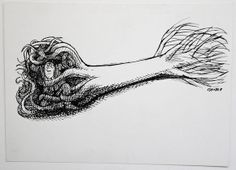
stalked by chronic fatigue, hugely embarrassing for this slave to the rhythm, if not enough to curl my toes. I feel like the morning after when I haven’t been anywhere the night before. My get up and go’s gotten up and gone.
My starter won’t start and my battery won’t charge up any more. I must have water in my petrol tank. I can’t do hardly anything. Must be a bad disconnection somewhere in my piston ring. Don’t ask me to shake a leg. My left one can convulse like mad-like Marlon’s in his convincing role in ‘The Men’ as a paraplegic war veteran. This has happened when I get jumpy or change my position in bed. Maybe I could get work powering an outboard motorboat. Lingering giddiness makes concentration fiendishly difficult. This all leaves me feeling drained, poorly, as if I’m not quite with it. To be fair, a stroke is not all bad news. It cuts both ways. As with the electric shock I had some years ago, I have to see it in part as a blessing in disguise. It’s very effective in frightening away warts- if you don’t mind the side effects.
I felt trapped in a hole so deep I could have started fracking.
At bedtime in the ward afterwards I cycled into a dark realm of disturbed sleep and ghoulish sensations. In a flap I once alerted the nurses because I believed some arsonist was coming to burn the hospital down. I could not banish such sights by simply closing my eyes and ignoring what might or might not be there. Lack of the rest that sleep brings became an agony to me that none of my medications could alleviate. Agony without ecstasy.
I’m now concerned that a series of trapdoors might be in the process of opening up beneath me. One thing leads to another, each more serious than the last. This has happened because something else isn’t working correctly, and that is wrong because something else is faulty.
Mountains out of Molehills
Old age is the most unexpected of all things that happen to a man.
Leon Trotsky
Navigating this uncharted brave new cockeyed world is as daunting as that which confronted the original Incredible Shrinking Man, where everyday objects and normal go-rounds suddenly take on new riskier, staggering dimensions. Like Scott Carey’s, my shrunken unco-ordinated muscles have forced me into an extremity of circumstance, shrinking from dealing with simple operations that I once took for granted.
Cut down to size by my flimsiness, even the simplest tasks from before can seem overwhelming and take ages to complete if at all. I don’t do things by halves. I do them by much smaller fractions. Every little laboured movement I have to consider beforehand belt and braces, whether it be deciding whether to tighten my trakkies, which of the two objects in my left hand I wish to release, looking for papers, planning pit stops, or wide-berthing and angling my ungainly way through doorways.
Lagging behind, losing my pace, I pare down every unnecessary movement, leaving time of course to move my body sufficiently to maintain functionality. As with Scott, looking both ways before I cross a room, a trip around my retreat has become more like an expedition in the works than an off the cuff action. When I fall down, I wonder what else I can do while I’m down there.
Getting a snack or cleaning myself- simple acts turned into chores. It’s not just my knickers I get in a twist. My pants, my blankets all get tangled. I’m up against it simply walking. Lurching is a better word for it. – it’s murder more often than not. My ‘peg’ leg just comes along haltingly for the ride. Jarring on impact with a clomping footfall, it can either fail to follow through, give way without warning or plain freeze. In open spaces where I have nothing to grab hold of it tends to tense up. In which case Hopalong Cassidy has just got to hang loose and wait it out before I mosey on. Not cantering but canting.
‘You should see me when I’ve been drinking’, I say to people, though I do little of that.
Please remain in my favour. Because of my left side, off the wall deficit, while moving, I can swing out at things on my left side without meaning to. Make sure you stay on the right side of me.
It’s easier for me to get to the right by schlepping leftward and around. Going round in circles. You know the feeling?
Waddle I do. Maybe I could move ahead getting a research grant from the Ministry Of Silly Walks. A berth as a tourist guide in Pisa. An artist’s model posing as a still life. Work as a stand-over man leaning on welchers, threatening glancing blows. Work in the physics department, demonstrating the principle of inertia. Become the greatest stand up comedian specializing in those lame ‘Mummy, mummy, why do I keep walking in circles?’ jokes. I would run rings around everyone else. I could hobble straight into an acting job as a drunkard, mutant or zombie. My left side deficit throwing my knee and spine out, leading to me articulating ‘Aargh!’ perfectly, I could hobble int the role of a buccaneer in ‘Pilates of the Caribbean’. Or like Oskar Ekdahl, as a ghost. If I break a leg, I’d get cast for sure. You never know your luck in the big city. Ever.
Walking on the wild side, hindrances to safe passage pop up everywhere. The most dangerous territory can be anywhere outside my house and beyond this protective carapace where hurdles abound. Hazards, potholes, ridges and mishaps lurk in gravel parking lots, on footpaths of cracked cement and uneven kerbs. I like terra firma; the more firma, the less terra. Unless manicured, our lawn becomes a jungle with various hidden traps. The evenness of this ground zero is a big consideration.
Lumbering down inclines is much harder than going up.
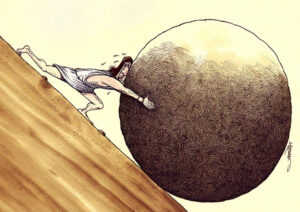
The gentle slopes in my garden—formerly imperceptible– are much more demanding for me than were those of the lower reaches of the Himalayas .
As for dancing, sliding and gliding -forget it. I would only only shake, rattle and roll. Flip, flop and fly. What I miss is strolling leisurely, ambling along at an observant pace, not having to concentrate so hard on keeping upright-with an independent air.
While I’m most assured when indoors, this tricky terrain is strewn with its own pitfalls. It’s difficult for my left leg to clear even slightly uneven surfaces. Just as carpeting, cables, stairs and slippery floors became dangers to Scott, taking on the proportions of precipitous cliff faces, sheer escarpments and bonebreaking surfaces, so too are they to me, threatening to trip me up, unsteady as I am to start with, impede my progress, or lay me flat on my back. Grounded, caged and constricted, immured within the house, itself a potentially lethal environment, I tread very carefully.
‘Remember to look up at the stars, not down at your feet’, Stephen Hawking exhorts us. On the march, waving their tiny antennae, our fine formic friends countermand this. I’ve avoided squashing thousands. In tune with them, my life has become an obstacle course in every sense of the word. Standing on shaky ground, I’m completely out of circulation. The good thing about my next journey? I won’t have to pack.
Like Paul Newman’s character Henry Winning, convicted bank robber, who was transferred to hospital from prison with all the same symptoms as me, this homebody’s at the mercy of whatever impinges on my space. Henry colourfully illustrated the everyday vulnerability which paralyzed people are faced with. “One day this cockroach just climbed up my collar, decided to take a hike around my face. He parked half on my upper lip and half inside my nose, just scratched around in there looking for a little action…” I got bitten on my back under the shower by a whitetailed spider, not long before I blew my stack. While not brobdingnagian as that which menaced Scott, it’s sharp bite, potentially fatal, left a nasty skin lesion. A return call with me balanced precariously under the shower in my bathtub would put me not on my mettle, but on the harder stuff.
Walk, don’t Run.
Children, don’t do
What I have done
I couldn’t walk
And I tried to run.
John Lennon.
One tiny misstep, one slip up, can send me tumbling down the slippery slope into a yawning abyss of misery. During the first two and a half years after the Event, I lost my balance several times but managed to land on my rear unscathed. Then one eventide bang in the bosom of my family, I came a whopping gutser. Losing my balance on the carpet, whoops a daisy, Humpty went sailing forward lickety split, all arms and legs flailing, all akimbo, landing smack dab on my dicky side. Not a pretty sight. Stopped cold, roaring like a wounded bull, I struggled to sit up. I wasn’t putting it on.
A paroxysm of pain, like a thousand devils, swept through me. Rather than piling on the agony, I was agonizing on the pile. But unlike William Holden, tripped by his rug, I was still alive. The following day I had to be hoiked out of the house headfirst by ambulance and hospitalized for a few weeks. X rays ruled out fractures which left me not with a split licketty but bruised ribs, by no means as benign as it sounds. As bruised as my pounded ego. This rough trot set back my progress by a year. This was a crash course in survival. My worst enemy now is gravity. It gets me down more than ever.
While the only thing that can swim is my head, things otherwise are not going swimmingly for me in the pool, Kerplunk! I don’t capsize and stay afloat. It gives me buoyancy. However there has been no miraculous flow on to free up my inner stiffness, no rejuvenating ‘life force’ to absorb, making me feel cocooned, younger and stronger. Having long given up prospects of walking on it, I wade through the water with my inimitable Australian Crawl.
Ferrying things around the house bit by bit get rather irksome, but taking it on the chin, I keep it up. To increase the tipsy load, I take the bit – any bit – between gritted teeth. In this kitchen sink drama, I feel as washed up as the crockery I take charge of.
In my highly structured life, I carefully plan everything especially what my menu for the next day will be. I plan all my meals in advance.
Now that’s some food forethought.
As for being able to plan my personal affairs, this has tended to go by the board. Falling through, all in tatters, all part of the inevitable unravelling process. I just tend to rack up papers as I seem to have lost most of the organizational ability I banged away at developing. I have difficulty getting on top of things. Things tend to run away from me. With lots of unfinished business, scaling everything back, I have my paperwork – much of which involves cutting things out – cut out. Have I shot my bolt totally? Where is the life that late I led? Where is it now? Totally dead?
‘What would become of me? I wondered.
Hell’s Bells
To top matters off there is the intensification of something I had before the stroke. If the buildup to the breach of the vascular wall had been going on silently, the repercussions would be anything but. The message was loud and clear. My tinnitus – the constant ringing in my ears is now horribly pronounced. High frequency cicadas in my head that no one else can hear. As I was aiming for a ringing endorsement of my work, something got left out.
The dratted sensation, that hum in the drum, is like many things. How many? Don’t ask. It’s like that of having the ringing sound associated with electric static you experience on TV or radio always around. This figures as it is believed to be the electric charge of the central nervous system in its aural form. It’s like the silvery sound of endless seething seas, hissing and receiving across sand. The cacophonous symphony grows louder the more I think about it.
I listen closely to my body now. I don’t have much choice.
There’s an Australian thriller ‘Noise’ which features a policeman assailed with this abominable crown of thorns. The dull knelling sound creeps into every scene amplifying my own.
Another movie, ‘The Dallas Buyers Club’ shows lots of scenes where Matthew McConaughey’s character has tinnitus from HIV related illness. I hope the success of this movie will bring about more awareness to this condition.
That infernal racket is in full swing, setting my teeth on edge, when I start to stir before dawn, before the manifold sounds of the city come into play to mask it, distract me or drown it out. The most welcoming counterpoint is the beautiful warbling and twitter of our local birds, replacing the cockcrow to herald the new day. As far as I know so far, there’s not much you do about the ding. I just have to cop it sweet. My advice to anyone suffering from this affliction: “If you hear your ears ringing… Don’t answer.”
The sound naturally conjures up to me that made by the air rushing past me as I fall from the sky.
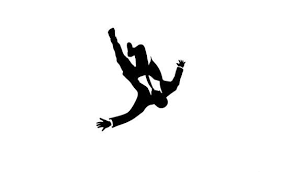
My task then is to convince my brain that is the whooshing of the air as I fly around viewing the wonders of our planet on my magic flying carpet.
As well as this, noises that previously would not have flustered me in the least give me such a turn. As for the gunshots that so jolt the flatfoot, these would have me jump out of my skin if I could do so. Then again, not that it’s all bad.
Stars that used to twinkle in the skies,
Are twinkling in my eyes,
I wonder why?
It was when I started to see flashes of light from the side of my left eye that I realised that together with the sounds they made up a silver lining. I was experiencing vitreous detachment. Let me explain. The vitreous contains the humour or limpid gel that fills the space between the lens and the retina, the lining of photosensitive tissue at the back of the eye.
At birth the vitreous is attached to the retina. Over time it changes, shrinking and developing pockets of liquefaction, similar to the way a gelatine dessert shrinks, or detaches, from the edge of a pan over time. The vitreous shrinking causes a pull in vitreoretinal attachments, irritating the retina and causing it to discharge electrical impulses. These impulses are interpreted by our brain as ‘flashes’.
As well as my joints cracking and crunching, I can now hear my thudding heartbeat in one ear. With a bit of luck, the temporal bone in my skull will thin and I’ll get SCDS. Then I’ll be able to hear the swishing of my bodily fluids. I’ll able to hear my eyeballs squeak in their sockets and my brain wobble.
Why do these strange things come about? Doctors point out, such things happen with age. Coping with them is an issue of mind over matter. If you don’t mind, it doesn’t matter.
So I say eat your heart out young yuppies, you who pay extravagant amounts to experience, ‘son and lumiere’ and cataracts in the world’s top tourist sites. I’ve get them built in for free in the comfort of my little corner of the world without having to jetset anywhere.
I’ve developed a great sense of vitreous humour.

Matter of Time
‘Well it’s a good life and a good world, all said and done, if you don’t weaken, and if you know that the big wide world hasn’t heard from you yet, not by a long way, though it won’t be long now…’
Arthur Seaton.
Before this Event I was plumbing the slippery depths of cosmology. I started reading a fascinating book about anti-gravity. I found it impossible to put down.
I had purchased a copy of Stephen Hawking’s ‘A Brief History of Time’. I had wanted to be able to think more like Hawking. Now my darkest hour upon me, I feel more like him, turned inside out after the Big Bang. We both know full well where a freefall into a black hole can lead you. A world falling round our ears. On borrowed time like ours, the interest rate is sky high. It was later than we thought.
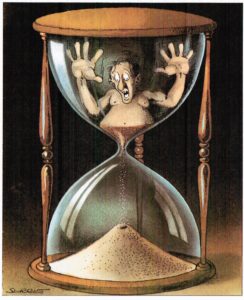
Life is like sand. It trickles away-youth, strength, looks. Everything except our life choices and feelings. It’s inescapable.
My future will soon be a thing of the past. ‘Gone’ past ‘Here’. Before this transformational event I lived for the future, although like every sentient human being I was discovering how it wasn’t what it used to be. Time speeds up as one gets older until it runs off the spool at the end. As the months fell off the calendar the cold realization that I’m still here finally set in. Now waking up I begin by saying ‘am’ and ‘now’. Now the future is so problematic I feel stranded in the now and the past. This is difficult territory as I have to constantly counter the inevitable ‘what if…’ and ‘what could have been’ line of thought.
‘Live each day as it comes, ’I hear you say. ‘Tomorrow is another day’.
Not true. Today is another day. We have no idea what tomorrow is going to be. It might turn out to be another day, but we can’t be sure. If it happens, I’ll be the first to say so. But, you know what? By that point on the space time continuum, it’ll be today again.’
One Mind Blowing Experience.
Gotta get up, gotta get out, gotta get home before the morning comes. What if I’m late, gotta big day, gotta get home before the sun comes up Up and away, got big day, sorry can’t stay, I gotta run run yeah, gotta get home, pick up the phone, I gotta let the people know I’m gonna be late.’
Harry Nilsson.
‘A calm and modest life brings more happiness than the pursuit of success combined with constant restlessness.’
Albert Einstein.
Bang went my peace of mind, shaken to the core. Gone my bright, sunny irrepressible disposition, my get up and go, my unsinkable “joie de vivre’ – all packed up in one fell sweep. To think that only yesterday I was cheerful and chipper, full of play. I went straight from feeling super to feeling superfluous. I went straight from walking on air to walking on thin ice. I went straight from being on a steep learning curve to being a steep leaning curve. Seriously deflated, my ability to cope with the emotional trauma concomitant with this condition is sorely taxing. At times I feel the menace of mental havoc. Like 4.00am when I wake in a cold sweat wrestling with my blankets and this heavy nagging foreboding. In my upbeat years I had been chasing a dream—now I am fending off a never-ending nightmare. Oh make me wanna holler.
If you think the corporeal features of stroke are bad, that’s not the half of it. It’s the morbid psychological ones that wreak the utmost havoc: fear, anger, frustration, depression. It’s a negativity, an absence, a greyness, a cloud. And a generalized human anxiety about the approach of death. This sense of pending doom like that expressed by Beckett’s characters, marked by immobility and a hopeless inability to alter the consequences of chaos. Most memorably in ‘Happy Days’ through the concrete image of a woman sunk waist deep in the ground in the first act and up to her neck in the second.
Well I never felt more like singing the blues. Just thinking about me being so knock kneed makes me shudder, frightens the living daylights out of me. Forced to ask tough questions about myself, always together before, someone whose head was screwed on tight. Through the prism of my stroke the glare of my defects of character-flaws, foibles, follies and failures, is magnified multiply and unrelieved. Above all the regret of having come up short, not realised my full potential. My pangs of anger have been directed at myself for winding up in such a pinch. On the threshold of sixty years of age, before my time, I placed such a burden on the shoulders of my long suffering partner. Not seeing any immediate and tangible results, like Ethel with Gus, she hadn’t been completely enthused by my mission.
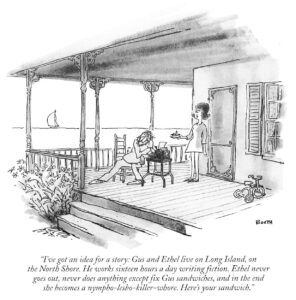
She had come to see my doing what I, her awful wedded husband, chose to do in life as a precious indulgent luxury. Understandably so in light of my shortfall.
My pangs have been directed at myself for my ignorance. A year before my big one I had a mini stroke. I know this now from what I have learned. I felt giddiness and staggered from chair to chair in our lounge room until it passed. Ting-a-ling, this was not just a funny turn. It was my wake up call to stave off what was looming- but I didn’t hear the bells. That day I had eaten at a dodgy restaurant and I put my symptoms down to food poisoning. That’s all I could think of as I’d never felt like that before. I failed to spot the menu special that day – Red Herrings.
I hadn’t been feeling indisposed. True, problems in the plumbing department had surfaced. The cracks were appearing. I did have high blood pressure which my general practitioner advised to bring down. I cut down my salt intake and went swimming more. What I needed was to hear was ‘It’s your funeral’, strong portents about this insidious scourge—how this disaster waiting to happen can creep up on you like thieves in the night, ever so gradually, ever so secretly and cut you down in your tracks. Was this why what G.P.’s do is sometimes called medical ‘practice’?
Nobody told me there’d be days like this. I was due for a full tune-up. I probably needed prescriptions for some of the pharmaceuticals I am on now. Taking my medicine, I do hear such warnings from the federal government now. They have launched a serious media campaign of awareness to stroke as the third biggest cause of death in Western countries and the largest cause of disabilities. There are five million survivors in the U.S.
It was a long time coming. Ripe for the picking, like most people I was , living in my own world, working like a maniac. Our underlying problem is that we are working and living too hard in a mad congested social rush driven so frenetically by an anarchic cutthroat military-industrial complex that creates so much white noise, disequilibrium and stress pell mell, everything going ‘time is money, get it while you can’. Even in the best of times that was so. How much more so will it become now the global economic crisis deepens and deepens. The white heat overwork epidemic that has led to Australians clocking up among the longest working hours in the OECD. The way things panned out for me involved making up for lost time post haste in the nerve-wracking, feverish, over- arching race to buy a family house and, full tilt, hard on myself, perpetually on edge, on the go go, reaching for the secret, crying for the moon, to build a self sustaining rewarding career. I was always trying to prove myself all the time with an absolute determination to do things and blow everything away in front of me. Quicksilver had to win.
Varoom! Opening up, full on, pumped up, pedal to the metal, greasing the wheels, murdering the motor, all cylinders firing, locked into formula one high gear, powering along, burning rubber, caught up in the punishing high octane, souped up race for takeoff, carried away to the exclusion of almost everything else. Hurry, hurry, always in a hurry. Is this why they call it the human race?
Out on the streets when the traffic started jumping was the time when my blood started pumping. Sleep being at a premium, I went into overdrive, pulling out all stops, opening it up, gunning the engine, stoking my way stonkered body’s furnace to stay on the treadmill, barrelling along faster to stay in the one place.
Zowie. Giving it all I had, never cutting corners, never slackening, opening it up even further. Like a bat out of hell, pushing my luck, hard-pressed, wrapped up in my work, forgetting myself, shrugging off concern, running myself ragged, reaching breakneck speed, tempting fate, taking it to the limit one more time in my fuel injected, nitro-boosted flight- you’ve got the picture?- a man possessed of howling ambition, a man driven, trying to push through, to advance at any cost. A man riding for a fall.
My maxim had long been ‘Let it rip’ but what ended up ripping wasn’t what I had had in mind. In the hot seat, in the land of Oz, hurtling round the Emerald City, fast and furious. Whoosh! Ruled by the clock, it was too late to turn it back. For fast acting relief, I needed to slow down. To pace, not race. To curb this urge to do a thousand things at once.
Too late to bail out, something had to give. Didn’t see the stop sign, took a turn for the worse, hit the skids. Mother Nature can only take and forgive so much. To think I spent more time worrying about my car being on the blink than about me blowing a gasket. Bubbling away, this pressure cooker needed an escape valve, to ease up, downshift and take my family for a holiday.
‘So we’re not going to Thredbo this year?’
‘No. It’s New Zealand we’re not going to. It was Thredbo we didn’t go to last year.’
Some friends brought me back a gift from a destination we’d never made it to. Every time I reached into my pocket and took out my wallet made from kangaroo scrotum I’d remember,’ Yeah we’ve never been to Broome’.
We never made it to the Great Barrier Reef either but that year it was for a different reason. It was closed.
I purchased a map of Australia then gave Leonor a dart and said, “Throw this and wherever it lands – that’s where I’m taking you when we can.” As it turned out, we didn’t follow it through. Otherwise we’d have spent two weeks behind the fridge.
Like many things, I was always going to be able to manage this but my ship never quite came in. The life of this phoenix turned out much more irreversible, far flakier than I had bargained for. My days turned out not unlimited as I had expected. Unable to back up, to turn the arrow of time, to lure back the moving finger, press the re-set button, undo things. If youth but had the knowledge and old age the strength. I have to concentrate on keeping equanimous, level-headed and not giving in to demoralizing downbeat despair. Those ghastly sinking feelings can overwhelm so suddenly.
Seeing I can’t throw my hands up in the air easily, I pick myself up again, reminding myself with a kind of Zen illumination: ‘I am after all alive’, but vulnerable at all levels to being overpowered. I used to give the impression of granite; now there’s limestone within. I used to be so easy going, feeling indispensable, indestructible, unstoppable, full of staying power, starry notions, on top of everything within my means, sure to have my way. Even as the tell-tale signs of aging were appearing, pointing to trouble ahead, I clung as tenaciously as a barnacle – or was it stubbornly – to the rose coloured mantra governing my generation – that that nothing was ever going to hurt me, that I was meant to be here, that everything was possible if I put my mind to it. That I was really on the verge of Something Big. Oh yes I was the great pretender.
Though I saw it all around, I never thought that I could be affected. Made of sterner stuff, unaware of my limits, I thought that I’d be last to go. That dying was the last thing I’d do. In my youth I had thought of old age as a time I’d fondly look back on.
My favourite joke was that I was going to live ’til the end of days – even if I died in the attempt.
I constantly assured myself, ‘So far so good’. Yet the more staunchly I defied my age the more it bit back.
I’ve got no choice now but to accept my fate. I’ve got my faults, but living in the past isn’t one of them; there’s no future in it.
New Boundaries of Being
The point of living, and of being an optimist, is to be foolish enough to believe the best is yet to come.
Peter Ustinov.
Constantly reminded how life gets us all in the end, I can’t fool myself very convincingly any longer. I have to accept my body has limits. My brain might be ready for Beethoven but my body is ready for Bach. No more denial of my immunity at the ultimate level. I’ve come to accept it as part of the deal, the unwritten guarantee that comes with your birth certificate. Like all us mere mortals, I can’t skip death, put it off gracefully to a later date, go out on a high note, or even in a blaze of glory. What a comedown. Definitely not the break I’d been hoping for. Out of order, out of sorts, I get on pins and needles about every little thing. About creaking across the road, shambling skew whiff in the street, toppling over. About the wind – it doesn’t take much more than a breath to blow me over. About the chill that winter brings, getting bundled up and weighed down, the mounting pressure to sell up our home and about ending up in a wheelchair again fulltime.
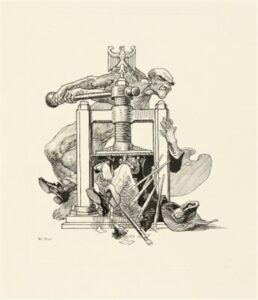
Feeling trapped inside my own flagging body, grieving for my functioning self.
In the ‘Desperate Housewives’ black comedy, Orson Hodges lays it on the line to his nefarious mother after she suffers a stroke during her last abortive murder attempt. Ducking and diving turning her in to face charges, he points out to her that her paralysis has resulted in a more severe sentence hanging over her head, worse than she would receive from any court. One without parole.
My story can be told in three tenses: future conditional, past both perfect and imperfect, and present indicative.
Dragging my overladen baggage stuffed with loose ends, crowding out the dreams, all my long term plans hanging in midair, I have to plough through an emotional muddied minefield booby-trapped with impossible choices and ethical puzzles past and present. At the edge of reality I have to churn up the psychic silt, all the noxious sediment that had long settled where it was meant to be, deep down out of sight. Shaking loose all of this in order to reach the happy memories. But at least they are there, the old familiar places, and I, my own man, past master of my own destiny will make it. Back in control of my life. I’m not the only one who’s made mistakes but they’re the only things that I can truly call my own. And if I don’t make it, it won’t be from lack of trying.
‘Make it to where?’ you might ask.
I intend to live to at least 77, the average life expectancy for the average Australian male. Plus three more for a good round number.
Our age should be judged not by how long we’ve lived, but by how long we intend to keep on living.
‘People say ‘life is short’. It does seem like it but it’s the longest thing anyone ever does! What can you do that’s longer?’
Different Strokes for Different Folks
Sic transit gloria mundi- “thus passes worldly glory.”
No matter has become of greater interest to me than accounts of how others have dealt with this sentence. You might say I have stroke on the brain.
They come in all shapes and sizes. I now know that they can happen to every man and his dog. I make mention here of the calvary reached by some noteworthy characters who have come to my attention. I feel for them as fellow sufferers if for no other reason. None of us make it out alive anyway. Facing the Great Leveller there is but one degree of separation between us.
Each stroke being sui generis, the severity of the sentence varying from one person to another. Mine lies between that of the two Sharons. On the way to the hospital I heard on the radio that Israeli strongman Ariel Sharon had had a massive one. He was now living the dream, but of a different sort. As his country’s weakling of the highest order, he vegetated for eight years in a coma having suffered frightful internal complications before expiring.
The other is Sharon Stone who had her stroke at the time of the attack on the World Trade Centre. She didn’t take any immediate action and carried on somewhat befuddled. Before she got treatment her malady went unnoticed in the trauma of the first day’s post 9/11. Wispier than when I last saw her, she was deeply affected by her experience. It took her a year to approach normalcy again. I haven’t seen any ostensible sign of paralysis in her so presumably her stroke was relatively mild. She has since reprised her role as the siren for which she became famous.
The cerebral stroke suffered by Edmund Hillary while mountain climbing in 1954 didn’t stop him going on to greater things. On each new visit to high altitudes, he took an ever greater risk with his cardio-vascular system.
Robert Evans whose Mafioso tentpole features the Godfather’s stroke knew what was on offer when he produced his own neurological blockbuster. Happily he speaks of his own good recovery.
Then there are the strokes that lead to speech and hearing problems. The aphasic stroke of Baudelaire, the French poet, led to his loss of speech, understanding of language, paralysis and death at the double. Tony Blair’s father couldn’t find his voice for three years after his attack. Kirk Douglas’ was signalled by a painful sensation in his right cheek followed by a slack-jawed inability to talk. Anthony Hopkins, who watched his ‘reel’ wife fall fatally in ‘The Human Stain’, his ‘father’ fall just before his fatal stroke in ‘Remains of the Day’, handed down these stories on the set of ‘Legends Of The Fall.’He demonstrated the distortion it can bring the face. It’s a good job I escaped this aphasia. My mobility’s difficult enough without lymph problems. Walking with a lisp.
The stroke of Francisco Goya, the Spanish painter who captured horror so masterfully on canvas, was brought on by a coach accident. It led to his loss of hearing at the age of 47. He died from a stroke at the age of 82, a long period in between, which gives me some glimmers of hope. They can occur seriatim which happened to Dr Coombs about whom I will write later, Elizabeth Taylor, Margaret Thatcher and her friend, the late General Pinochet. Like her matrimonies, Elizabeth Taylor’s came serially. She had gone for a Burton as did Dickie in the unhappier sense when his number 59 came up, having his stroke at the same age as me. I had cautioned him to take care, but you know what these fast living high flyers are like.
In the Spanish film “Salamina Soldiers”, an old infirm republican veteran from the Civil War-a true Wobbly if ever there were one – remarks how befitting it is that it’s his left side that is paralysed whereas the right remains bolt upright and solid– like the political right. I try to avoid becoming one sided. Of course when it comes to one’s leanings, it can cut either way. Walter Koontz the stout hearted prejudiced upholder of the state, now reduced to tears, anguish and raging frustration, was stricken on the right side.
Strokes have no respect for ideology as the above examples indicate. Robert Menzies, Australia’s long term big wheel would become a fifth one, rolled around after his seizure.
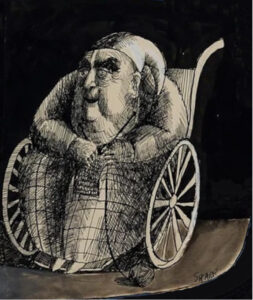
The Portugal fascist dictator Salazar, Winston Churchill, Stalin and Leonid Brezhnev were all candidates for this affliction. Propped up with no official reference to his condition, as was the Soviet practice, Brezhnev’s eventual consequential decision to back the coup in Afghanistan followed by military intervention, contributed to the political paralysis and unravelling of the Soviet Union and a seismic change in global geopolitics.
How are the mighty fallen. Sapped of his strength, cooped up in his home, Joseph Kennedy, the puissant patriarch of the Boston clan, tired of counting up the number of his dead children, saw the last two get killed without being able to utter a word. He could do diddly squat to allay his torment. Such terrible thefts. God forfend this ever happen to me.
Damaged Goods
‘ How much can a koala bear?’[Austen Tayshus]
Quasimodo, Couch Slouch, mouse Potato, Sluggish Snail, Beached Whale. To name but a few of the weird and wonderful characters and creatures I feel I’ve morphed into vicariously. As you’ll see the list goes on. These weren’t part of this script I was to stick to. Surrendering the things of youth gracefully. Dancing in the dark, walking through the park and gardening. Reduced to basic survival, life gone terribly amiss, my bubble burst. I needed this stroke like a hole in the head, which is what it is in effect considering the death of brain cells. It was a devastating blow to me, bereft of my life force, pinned down by inertia. Engaged in meaningful activity, I could always keep going, sweep the issue of potential withering of my faculties under the carpet. I could handle any adversity by the sweat of my brow, as long as I was in the pink. Neither an uptight, 9 to 5, clock punching, buttoned- down man of convention, straight as a die without the tie that might pinch off my circulation, marking time, standing on ceremony, collecting my pay cheque, nor one who waiting to bow out, be led out to pasture at a certain age, I had no interest in putting my feet up, in endless leisure activities. Not one little bit. I’m aware of the fact that the number one killer of old people is retirement. When people have got a job to do, they tend to live a little bit longer so they can do it.
My best work was yet to come.
My security hinged on my functionality. No narrow margin for error. Having wound up too clapped out to do lots physically, my golden years will be somewhat tarnished.
I was a big man yesterday but boy you oughta see me now. The effect of my chequered life can be seen writ large on my gaunt, grizzled lived-in features. Face to face with my self, taking a long hard look, I wondered where had the play of movement in my formerly expressive face had gone. The question was ineluctable. Is it a trick of the light or is that wan haggard reflection in the unflattering glass really mine?
My doctors confirm it’s the very same, that my eyesight could be much worse.
I get to and from medical facilities on a community bus whose drivers give me every assistance. ‘Take My Hand, I’m a Strange Looking Parasite’, I urge them, rephrasing the lyrics from ‘Kismet’, as they guide me aboard.
One of them whose first language was not English needed a little assistance with it’s finer distinctions. ‘Can you see me across the street?’I asked him.
‘Hold on. I’ll go over and have a look.’
One learns one’s scale. Before this downfall, carrying all before me, the weight of the world on my shoulders, I endeavoured to help turn it on it’s ear. To give it the slightest nudge. Now it’s painstakingly difficult just to change my position in bed. Before I felt I was getting more momentum behind me but that’s what you get from going downhill. Before, I still felt I’d only just begun, so much of life ahead. I was on the approach path, warming up for take-off, heading for bigger things. To better help others, not just myself. Now what’s left of me feels more like death warmed up, like I have been trampled by a rampage of Rugby League forwards. My musculature is all out of whack. Torque about twisted. My poor body feels more twisted than Chubby Checker’s, more bent than J. Edgar Hoover’s. Getting out of bed for some time usually took ten teetering minutes for The Crooked Man, all six foot one of him, to get his balance. A headrush can happen to anyone who stands too suddenly, but this wasn’t the dizzying heights I had been aspiring to. One of my therapists, Theodora posited I hit the deck ten minutes later than usual. Seriously though, the overall effect of being so fragile like this that you are always aware of it. Any comfort zone to which I can retreat has narrowed considerably.
Don’t get around much anymore. I stay put. I can’t go here. I can’t go there. I just don’t go out. My family call me Pilot Light.
If you tell me you haven’t seen me for ages, I’ll tell you that mobility is over rated.
Secreting fewer endorphins, walled inside our house, I’m at my best propped up in our sofa absorbing some good offering on television, shifting around, rolling my ebertian eyes or else catching some rays, soaking up the early spring and autumn sun. I worship it more than ever. I can see it. The things it brings me are quite apparent all the time: heat, light and food. There’s no mystery about it, it doesn’t ask to see the colour of my money, I don’t have to dress up too much, and there’s no pageantry.
Otherwise I’m aching.
It is said of today’s baby boomers that ‘the 60 year olds’ are the ‘new 40 year olds’.
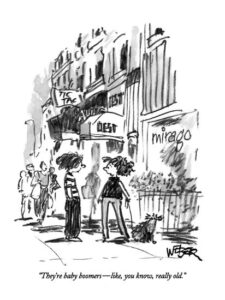
Well this young crock is one of the new ‘80 year olds’. I always like to be one of the first.
I used to savour living in Sydney so as to have access to its libraries. As book by book I built up my own library, my access to the city libraries became less. One reference book I make sure to keep handy is ‘A Beginners Guide to the End.’
With my own books way out of reach, my life’s so circumscribed that I surrender to suburban lassitude. Watching a lot of movies has become my main shot in the arm.
Keeping an eye on the world going by my window, i’m taking my time. I used to love zipping around this pushy harbour city. My car sat idle at the front of our house for two and half rough and rainy years only having been driven by me once. That was fairly nerve wracking. This drove home that life for me was no longer in the fast lane but in the oncoming traffic. So now I’m now relegated to being a permanent passenger.
I didn’t want to share the misfortune of Peter Griffin, back behind the wheel after his stroke. Peter, the main character of the animated television series ‘Family Guy’, his long face all askew, was all over the road singing along to his car sound system: ‘It’s The End Of The World As We Know It’. After crashing through street signs, letter boxes and rubbish bins, he careered off the macadam down an incline head- on into a riverside tree. As if to mock him, a rowing crew were worked past him to the chant of: ‘Stroke!Stroke!Stroke!’
My past surging around me, I started losing ground .I could only look on helplessly as my dear tip top Falcon and slowpoke I, scarcely past our prime, were overtaken by smaller, buzzier runarounds. It was as if we too were being mocked. My sturdy trusty workhorse was the first write off to the glue factory. My abilities being smothered, I guess my race is run, like some old joke one can’t quite remember.
I had been working towards greater mobile rigour, but not of this tortoise kind. Still, it’s all over the mortis kind. Infinitely.
I went through many of the tests in life that we humans set for ourselves to qualify for something or show we are up there with the best. But the one I am put to now is gruelling in the extreme – the endurance test of my ability to withstand unrelenting strain and pain. How to take the edge off it? Each day of this awkward business presents exacting trials.
Like a white-tailed spider, reality bites. On my beam’s end it positively savages. As if to knock me down it came around and without so much as a mere touch cut me into little pieces. Ever mindful that all said and done I enjoyed a full, considered life. Life is not the amount of breaths you take. It’s the moments that take your breath away. My life well lived, I went where I wanted, did what I wanted with whom I wanted. I had the greatest reward that any man or woman can have on this earth-to love and be loved. I’m not the first person to end up on the bottom of the deck. I must emphasise above all, there’s a hell of a lot of poor beggars who suffer more. What matters is how I live with it. I’m reconciling myself stoically to my new daily reality, facing the expanding mortal coil. They ask questions of my character. If you yourself ask how I got to be so stoic, I have just one answer. Years of practice.
The Inner Soul.
‘Hello is there anyone in there?’ asked the nurse of Henry Winning peering into her patient’s frontage. Because the effects of stroke are internal, it is hard even for family members up to a point to appreciate what the stroke survivor is feeling. It has been put to me that because my body is intact, I should be capable of correcting the malfunctioning through will power. The daughter of one survivor I know thinks he is ‘putting on an act’.
In Henry Winning’s case it turns out that he was. He was faking it to get out of the maximum security jail and take to his heels. Having initiated the ruse, his freedom from prison depended on him pulling it off. In acting out this lethargy, he learned to feel what it is like to be at one’s lowest ebb and—to get through: ‘When you know they’re gonna be stickin’ pins in ya, it ain’t good enough to be playing possum… you’ve get to be a possum – a dead possum’.
‘You learn to funnel everything down so finally all you know, all you are, is a heartbeat. I’ve got to tell you, when you get to place like that, it’s one kick in the arse.’
When things get to overwhelm me, I psych myself into this state.
Fortunately most people take me at face value and accept what they see and what I tell them. Some sense instinctively that I have come a long way even if I haven’t disclosed much. I find this very encouraging, affirming my determination to go even further, to show my staying power and inner strength. I can’t let my side down.
People have come a long way in empathising with disabled, though some some have just a little further to go. A driver at Balmain Hospital noticed another jumping spritely from his parked car. ‘Hey, that’s a disability parking space, spastic.’
The driver alighting got in his wheelchair to go inside but pushed his luck too. Having been raised to stand up whenever a lady entered the room he did so in a waiting area. This is what led ultimately to his disability pension being cancelled.
I heard another driver fed up after having had to circle the hospital repeatedly looking for somewhere to park, say, ‘We should put ourselves in the place of people with disabilities. And I have to say those parking spaces are the best.’
The hospital has severe penalties for those parking incorrectly. A sign at the front of the hospital reminds the public: ‘Unauthorised Vehicles Only. Offenders Will Be Towed Away’.
It’s a Family Affair
When my way was dark and troubles were near, Your love provided the light so I could see. Girl, just knowing your love was near, When times were bad, Kept the world from closing in on me, girl.
(The Temptations’ You’re my Everything. Written by: Cornelius Grant et als.)
The effects of stroke act to drag your loved ones down in its wake. Tony Blair, who attributing his political genesis to his father’s massive stroke at age 40, singled out this event as the most traumatic event of his upbringing. For the brood of this wounded silverback, no savings to fall back on, it was no less so. With one of the two sources of support for the family down, the wind taken out of my sails, my tight ship threatened to run aground. Poverty is not a disgrace, but it’s terribly inconvenient. Everyone on board has felt great financial and emotional strain. Happily for Mr. Blair, his mother’s brother, a butcher, was able to step in and help bring home the bare bacon bones.
One can never underestimate the importance of the family as part of the rehab team. Doctors believe the love of Richard Gray’s wife played a huge part in his recovery. She was by his side through long months of treatment.
Diagnosed with PTSD from his experiences as an unarmed peacekeeper in Bosnia, Richard later suffered a brain haemorrhage leaving him unable to move or speak. Undergoing high-risk reconstructive surgery and intensive rehabilitation, all manner of therapists and his wife gradually nursed him back to recovery.
Summoned to care for the apparently dying prime minister in ‘Churchill’s Secret’ is a remarkable young nurse, Millie Appleyard, whose mining community’s strike had been put down by the army sent in by Churchill .
Nevertheless she who treats the world’s most famous man as she would any other difficult patient: with compassion, firmness, and occasional indulgence. In the weeks that follow, the two bond over the Victoria poet William Ernest Henley, whose celebrated poem, “Invictus” (Latin for “unconquered”), helps inspire Churchill to relearn to speak, stand, and walk.
She is ably backed up by Clementine who is able at last to spend the declining years of her famous husband- far away from the demands of war and politics. The rock of his life, she takes control of the situation.
In my case it’s my feisty commonsensical wife who ended up being the financial backbone of our family until I could get a pension. She and my sons saw me through the worst of this ordeal. They were in it with me. They got me walking on a frame along the corridors of Balmain Hospital.
‘Grateful’ doesn’t begin to cover what I feel towards her. Mere words could not explain. She went through such a lot. I wouldn’t have blamed her jumping ship.
One survivor I know of had a spouse who in terms of sensitivity didn’t have a patch on her. When he broke down in tears, his wife said to him, ‘Why are you so upset? It’s just your mobility. I’m the one who has to find another partner.’
As my disability pension pittance was pegged to her income –and as a schoolteacher’s income is not a princely one -I was dependent on my better half- or I can say four fifths. Over and over again. A tower of strength, her taking charge the financial side of things has taken a huge load off my mind. As for opening those long windowed envelopes, I’ve packed it in. I can’t bear to see what’s inside. So stone motherless skint I can’t even pay attention. Even if I were to write a blank cheque, it would bounce.
I had looked forward to the end of my financial difficulties, the same as those of most people, but I hadn’t realised which end it would be.
As I face the music, trying to dance, she has steadied off dealing out the ‘I told you so’s’, just getting on with it as women have always done. As did the wife of President Woodrow Wilson who carried on his work when he was unable to speak or move. All communication with the Commander-in-Chief went through Edith. She entered the sick room with messages and emerged with verbal instructions or the scrawl of a signature on a piece of paper. She purportedly insisted that she screen all of Wilson’s paperwork, in some cases signing Wilson’s name to documents without consulting her husband, convalescing from his stroke. Come the moment, cometh the woman. In effect the first woman U.S. President, Edith kept the true extent of his incapacitation from the outside world, simultaneously shielding him from intrusion and hiding his condition from outsiders.
Any Port in a Storm.
Having lost my moorings, we’ve had to pilot a tricky course through these straits to avoid foundering, to stay afloat. Weathering the choppy sea, me listing to port side, we’ve been buffeted by the full force gale. Close to the wind, we’ve had to batten the hatches, trim the sails, splice the main-brace. My motto is flagged on our masthead : ‘Use it up, wear it out, make do and mend, or do without’. To avoid being dashed on the rocks the whole family dynamic has changed at a rate of knots, with paterfamilias, wearing his clothing to the limit of usefulness, putting things off, taking a back seat, tail between legs, to play last fiddle, his first mate jettisoning some cherished carefully laid plans or postponing others. What a drag it is to be left dangling, one’s life put on hold!
‘You could have ended up in some two bit suburban nursing home, Allan.’
‘I wouldn’t be seen dead in such a place.’
‘You might well have been. You’re lucky you have someone to care for you here, although I can’t imagine why.’
The thing is we have many hours between us. Many hard miles. Moreover our family means everything to her, to me and to our boys.
I owe this super trouper big and have to try hard not to let my subsequent loss of esteem and tormented pride get the better of me. As a partner I must be as much fun as a poke in the eye with a hot stick. Through her careful domestic management, some loans and a frugal but healthy diet we have managed to scrape through the past years eking out a low-key spare living. The recipe, you might ask. After cooking my goose stewed in my own juice, I’ve eaten heaps of humble pie, swallowed my pride, licked at all that dried egg caked on my mug from yesteryear, and sugarcoated my bitter pills.
As for keeping out of the doldrums, we’ve had to change tack, making our own entertainment. It got quite difficult trying to go out with me the way I am. She just had to keep standing me up.
Enter The Ginger Ninja. Our carrot topped grandson, a little ray of sunshine, a joy to watch as he struts his stuff, stealing the show. Look at those red cheeks. All of one year old, this mere chit, swagged along with his toy mobile phone clasped to his ear. Barely out of nappies, nature boy threw his clothes off and danced around. To him, Leonor is as generous and open handed in her attentions as she is to our sons. Is she ever! She dances attendance on him like some to royalty, catering to his every whim and wishes, as long as they are healthy.
Five years later enter Pepe’s sister Nemireh too. Coochy coochy coo. ‘Nemireh, clap your hands. Do like I do. Do wacka do.’
Following the ancient and familiar ritual that I did, Sean would bump his second baby on his knee, cradle her in his arms, rocking her backwards and forwards, as he had to her brother. He would toss her into the air – and hopefully catch her. On the way up she would fill her lungs to protest, to cry in terror – only to issue a relaxing, relieving gasp when she escaped the force of gravity. The first laughs of a lifetime.
Springing up like bean sprouts,brother and sister love to play and shout..As babies they captivated us with their gurgles, squeaks and steps. They never have any cares.
These little show ponies have kept me and Leonor elated, ruffling their hair, pinching their downy napes, clasping their warm little bodies.. We always have their presence to look forward to.
Like kids everywhere they’re still at the only time in our lives when we like to get old. If you’re less than ten years old, you’re so excited about aging that you think in fractions. ‘How old are you?’ people ask Nemireh.’
‘I’m five and a half.’
She’s five and a half going on 6.
When she gets into her teens, she’ll simply jump to the next number. ‘How old are you,Nemireh?’
‘I’m going to be sixteen.’ She could be twelve but she’s going to be sixteen. Eventually.
When the great day arrives she’ll become twenty one. Even the words sound like a ceremony. She becomes twenty one and gets a key to the door. So shout hip, hip, hooray.
Then she turns 30. What will happen there? It sounds like bad milk. What will go wrong? What will change?
Then she will push forty. She will reach fifty. Then she will make it to sixty. By then she will have built up so much speed, she’ll hit seventy. After that, it’s a day by day thing. She’ll hit Wednesday.
She’ll get into her eighties; she’ll hit lunch, she’ll hit 4:30. And it doesn’t end there.
Into her nineties, she’ll start going backward. ‘I was just ninety two.’ Then a strange thing will happen; if she makes it over one hundred, she’ll become a little kid again. ‘I’m one hundred and a half.’
Picking up the Pieces.
“If you’ve found a reason to live on and not to die, you are a lucky man”.
Alan Price.
In salvaging what I can from the burnt out wreckage, having used up my quota of close calls, I would remember the comment made to me by John Eccles long since on the importance of adapting to a transfigured existence.
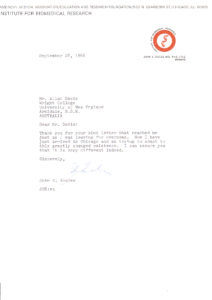
Professor Eccles had discovered the chemical means by which signals are communicated or repressed by nerve cells, for which he was awarded the Nobel Prize in physiology and medicine. He had outdistanced the field in his speciality. I joked to him that as he was going to live in Chicago, the best way he could adapt, if he was going to spend time in such tough areas as the Maxwell Street neighbourhood where Benny Goodman was raised, was to learn to run fast like the locals. To outdistance the field in their speciality.
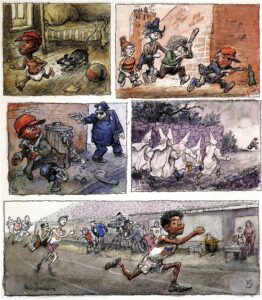
I too had always wanted to make something of myself. I too had always wanted to to be somebody. Now I have to be content with being more specific. Just me.
During my first weeks in hospital I had to be mechanically hoisted around. I had to re-learn the basic gestures of daily life, devoting hours a day to therapy, and regaining the skills needed to care for myself — like how to take a shower and button shirts, and eat with a knife and fork. A key to my restoring my normal bodily structure and function is the regime of constant exercise I undertake. Leonor and the boys laid the groundwork for this herculean task, getting me on a frame and taking short sliding, double steps, barely lifting my feet, scuffing along the corridors of the hospital. Taking it kinda slow and low, doing the Harlem Shuffle. How low can I go?
What I dreaded most was ending up in the kind of residential home depicted by Dr. Edward McLachlan.
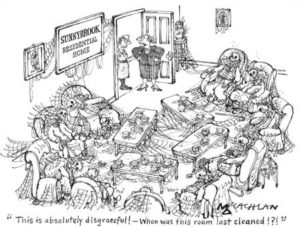
Before I left the hospital, the doctors not betting on my future, I didn’t expect to be around long. The discharging officer checked on my address. ‘What will be the best way to get in touch with you?
‘Just rap three times on my coffin.’
My next bed neighbour in the ward, Alan Lonnon had sadly lost the first of his two legs. He was in denial about this.
He asked his surgeon, ‘When will I be able to resume my dancing?’
The surgeon replied, Mr. Lonnon, may I point out to you where your deficiency lies as regards doing that?
Alan replied obtusely: ‘Yes, I think you ought to.’
‘Need I say with overmuch emphasis that it is in the leg division that you are deficient?
‘ The leg division?’
‘Yes, the leg division, Mr. Lonnon. You are deficient in it — to the tune of one. Your right leg I like. A great leg for dancing. That’s what I thought when I just came in. I’ve got nothing against your right leg. The trouble is — neither have you.’
When the surgeon left another patient tried to get Alan positive.
‘You could always work as a guide, Alan. If I need directions I’m not asking a man with one tooth, I’m asking a man with one leg. Cause he definitely knows the easiest way to get somewhere. If there’s a shortcut that one legged person knows where it is. You won’t be hopping fences either.’
I hadn’t considered hopping a plane to France myself.
Allan Lonnon told me how a medico had advised him, ‘Mr. Lonnon, you urgently need a holiday after all this trauma. Might I suggest Lourdes.’
When I made it home, I myself was wheelchair bound. I couldn’t stand being in it. The old chair was very stiff and the wheels were worn and didn’t turn well at all. Before I was discharged, Allan Lonnon gave me some reassuring advice: ‘Try and make it to Lourdes yourself.’
‘You think so, Allan. Do you believe in such miracles?’
‘There was a local fellow down on his luck exactly like you. His family scrimped and saved and took him to the pilgrim town.
They got him to the water’s edge and he couldn’t get in ’cause his leg wouldn’t move, so they had to hire a little crane and pick him and his wheelchair up over the water and submerge him. And when he came out, they all checked out his mobility.’
‘And he was healed?’
‘Heavens no. His left side was still heavy and stiff, but lo and behold-the chair had new wheels.’
Balmain Hospital’s physiotherapists worked on me to help me regain my ability to move and function . With an advanced understanding of how the body moves and what keeps it from moving well, they treat and prevent many problems brought on by pain, illness, surgery, impairment and disease, sport and work related injuries, aging and long periods of inactivity. They treat both in and out patients.
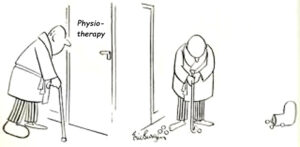
Once home, my physiotherapist coaxed me out of the wheelchair and after seeing my modest faltering baby steps he and others have been an ongoing source of encouragement for my return towards normality.
I had to take a stand.
‘That’s more like it’, says Leonor constantly. ’You’re coming along better every day. The show must go on.’
I’m sticking it out. I now rely on a walking cane. My assigned neurologist stated that my left leg will never be more than a prop. As of yet he’s mostly right-being positive doesn’t change the salient facts- but I’m determined to refute this opinion. While I, listless layabout Lazarus, tire easily and can’t stand up, walk or sit in a regular chair for long, lateral thinking leads me to not frown or take things lying down. Unable to bend my stiff neck around, I’m determined not to look back. Rather to stay the course and get back in shape, on an even keel.
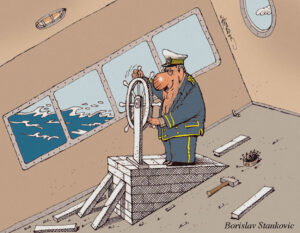
One step at a time.
Natural Therapies
I have been receiving acupuncture treatment and Chinese herbs. Sean, my eldest son, practices traditional Chinese medicine professionally and introduced me to a range of complementary therapies. His deft needling of my various points-a jab well done- brought me forward no end for which I am proudly grateful.
This porcupine bristles further, attending the acupuncture outpatients clinic at Balmain hospital. I advised one of the doctors Alex Yao to practice Voodoo Acupuncture. That way I wouldn’t actually have to attend. I’d just be shuffling along and… ‘Oooohhhhhh, that’s far, far better…’
I listened to hypnotherapy tapes and tell my body to heal. I command my toes to wiggle just like Uma Thurman’s character in the film “Kill Bill’.
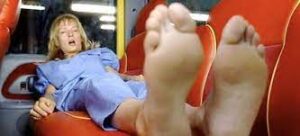
Unsuccessfully as it turned out. Maybe I too need Quentin Tarantino to shock and direct me to curl them. With Robert Evans in charge of production, of course.
Stretching on tenterhooks I push my limbs every which way but loose, ad nauseam, to relax, elongate these muscles, screaming for relief, and help their elasticity. It will be a long stretch. While I’m aware there’s no silver bullet in reaching my target, manipulative soft tissue therapy has to be my best shot. I respond well to assistance in stretching and massage, getting immediate and visible relief and some ease in walking. However this hands-on answer to pain relief is the one most overlooked, even though Hippocrates documented the medical benefits of massage- ‘friction’- over two thousand years ago. It’s as open and shut a case as a foldup massage table. I myself applied it in soothing the savage breast of one my students, John Altomare, at Concord High School. With the approval of his parents and in front of the class, I eased the heebie jeebies of this hyperactive boy, prone to throwing his weight around, by working on his back. Susan Sarandon’s “Icebound’ doctor knew this when treating migraine. But being time consuming and labour intensive it’s easily dismissed in orthodox practice as an indulgence. Now there’s the rub!. Such adjunct treatment costs an arm and a leg privately and doesn’t get considered in the public health system. I have had highly trained angels of the ward at my beck and call to bring me toileting aids.
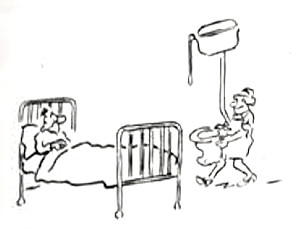
They would give me a leg up moving or getting me pills, access to the best educated doctors to prescribe any drug on tap—but not to anyone who could assuage my pain through the laying on of hands. Not to any therapist versed in tactile techniques, able to work through the knots and out of tune muscles. I had to hand it to the The Red Cross though, one of their hospital services vindicated my feelings on this matter. One of their lady volunteers visited the hospital on one occasion to massage needy hands. A drop in the ocean blue but a pointer in the right direction. When I broached this subject ripe for discussion with Daniella, one of the Hospital therapists, she pointed out that if they offered the use of touch as a service, there would be a queue lined around the block. Can you imagine- public hospitals as palliative centres where people could come to have their pain relieved without drugs? Now where’s the rub?
I can get a rebate for certain ancillary services such as osteopathy which I’ve found most helpful, but they’re still prohibitively expensive. I can massage myself to a certain extent and have achieved greater flexibility, but it’s never as penetrating as by others. I need to be kneaded.
Now I find I’ve changed my mind and opened up the doors. Help me if you can, I’m feeling down And I do appreciate you being round. Help me, get my feet back on the ground, Won’t you please, please help me? And now my life has changed in oh so many ways, My independence seems to vanish in the haze. But every now and then I feel so insecure, I know that I just need you like I’ve never done before.
BEATLES – ‘Help’
Never one of my favourite Beatle’s tracks it’s feeling of insecurity felt incongruous with my self image of confidence. Now the protective shell I built around my emotions has been cracked, I can like John express my dependence on others with a stinging honesty I couldn’t before. I could go so far as to say that Someday My Prince Will Come. In his album my brother Miles expressed this wish unabashedly, so why can’t I? Unlike George Costanza, fearful of male therapists, I have no shadow of a doubt about my orientation. Since the stroke I have felt like a damsel in distress waiting for a prince with strong hands to appear and ease my pain. I feel with consistent muscular therapy, not as a substitute for exercise but as a spur, my progress can be accelerated.
I needed a prince of healing to use his magic hands to alleviate my pain and get this hopeless case up on his feet and running. Someone whose sleight of hand could range over very soft silky tissue to armour plated skin .
After a decade of my waiting to be able to afford to pay for such services commercially, such hands materialized in the form of a locally based therapist. He knows how to apply simple, proper and precise techniques. With strong hands and a healing heart he knows how to help panelbeat my buckled frame, to help bend the bars that trammel me. To help me shake loose. This is a big ask. However nothing ventured nothing gained. Some say ‘Break a leg!’. I say ‘Wake a leg!’
Of course it could well be that a princess might do such a trick. One line of thought amongst therapists is that overly firm pressure to the muscles can reduce the flow of blood to them rather than sluicing them with their life-boosting properties. Horses for courses. Only practice can tell. I must say my vessels dilated studying ‘Manual of Love’[Part 2]. Not so much by the sight of the physiotherapist Lucia, played by Monica Belluci applying the healing therapy recommended by Dr. Marvin Gaye to the paralysed survivor of a car crash, as by that of another jumbo sized snack attacked colleague informing him that she had been assigned to his out-patient treatment-including massage. Turning his nose up at her, comparing her to our jumbo sized cetacean cousins, it seemed to me this guy had more than stars in his eyes. More like rocks in his head. It ain’t over till the fat lady does her things. This lady and a half looked like she could do a whale of a job relieving my aches and my mind. As looked Jerry Seinfeld’s squeeze, jody to him, when his strained neck felt as if someone was behind pulling on wires. A professional masseuse, Jody quashed Jerry’s desperate advances to her, hinting that she massage this highly stressed joint. In response she made it plain she just wanted a straightforward sexual relationship, no wires attatched.
Sometimes I wish I were in the hooves of those top sires and matrons that get fed beer and are regularly massaged to yield the Japanese their tenderest beef. They eat whales, don’t they? Maybe they’d fancy sinking their teeth into this lentil munching primate, someone lower on the food chain, provided they allow another thirty years for my flesh to improve in the necessary maturing process.
The Prognosis
Boy, you’re gonna carry that weight
Carry that weight a long time.
[ The Beatles]
How permanent is this impairment? Am I too far gone? How far can I pull through and mend? Will I be back in full action? Can I bring about a step change? What is my expected life’s new time frame? Can the brain cells banged up during a bleed regenerate themselves? Can new neural pathways be established? How plastic is the brain? This all depends on which part of the nerve centre is affected and on the severity of the stroke. In the light of mine, my general practitioner calls me nothing short of a Miracle Man. When he put his stethoscope on my chest, I asked him, ‘Doctor, how do I stand?’
He replied, ‘that’s what amazes me.’
The medical specialists tend to give less optimism than the paramedical workers who back them up. I ask myself constantly whether I can ever border on normality again through exercise and nutrition. I hear stories of people who have amazing recoveries but I suspect their condition is less severe. The survivors I have befriended with similar effects to mine don’t express much improvement. But I’m not ruling out further miracles. Like that of Forrest Gump who throws off his leg brace and starts running. Or that of Dr Strangelove who gets out of his wheelchair to announce “Mein Führer! I can walk’.
Feet don’t fail me now. I don’t want to go down for a third time.
The process of rehabilitation is a lifetime process. This is not my first bash at it. You might say I’m a double adaptor. I don’t much take to death. I was in the wars in 1974 after receiving electric shock and diddling death for the first time.
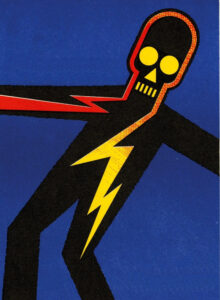
I received grafts on my fingers and was hospitalized for some weeks. The difference with that was that after the burns this live-wire healed with time and bounced back unflappably. Following a stroke like mine, after the acute phase of rehab, recovery usually tapers off after the first months. It is an agonizingly slow road to recovery and you don’t know if you will improve much more. Other stroke sufferers with effects similar to mine express the same plateauing of progress. In spite of this ultimately I have no choice but to take it on the chin and come out swinging because if I don’t I’m guaranteed to degenerate. I must avoid the avoidance of using my impaired limbs, that behaviour called learned non-use. As they say, ‘use it or lose it!’ I will avoid keening like that of Peter Griffin, staggering along the road, bowed down by his dead weight: ‘I hate being so strokey. If there was only some way I could be like everyone else again’. There’s no point in this.
If I go downhill, deeper into vegetative meltdown, it won’t be from lack of trying or holding onto hope. How could I with my muse Leonor and musos like Kate Bush in my catercorner urging me constantly ‘Don’t Give Up’. As the going gets tough, I’ll just stare despair in the face with my brave grin, bear up and push it aside. And if I cry out, I’m gonna push it, push it, push it some more. I’ve been up and down and over and out and I know one thing- Each time I find myself flat on my face I pick myself up and get back in the race. I just pick myself up, dust myself off and start all over again. A forced march of the mind. Miles and miles and miles of heart. Phew!
Life is indeed a miracle. It leaves the alternative for dead. Better to be stiff than to be a stiff. Better to make groans than to be bones. Better to be washed out than washed up. Better to be ‘over the hill’ than under it. When you’re over the hill, at least you pick up speed.
I’ll survive even if it kills me.
Survival is the prime command, the first thing that we are always commanded to look upon as the be-all and end-all of what we’re about. You can break all the laws as long as you can save lives. And if you don’t save lives, it’s not worth staying alive for. You know, this may be very naive, and it makes me sound like a do-gooder. I am not only a do-gooder, I am also a pragmatist. I know that it takes a lot of hard work to do the right thing and to believe in the right thing and to defend what you believe in. But that’s what I do, and that’s what I’ve been doing all my life. And I’ve got to keep doing it until I no longer can. You roll with what you’ve got and move on.
I suffer from a certain angst, but I’m not making a life’s work of it.
Hope springing eternal, I have to draw upon- without platitudes- the most profound lesson I have learned from it– the resilience of the human spirit in extremis. Best expressed simply by Charlie who wrote this evergreen:
Smile, though your heart is aching,
Smile, even though it’s breaking.
When there are clouds in the sky-
You’ll get by.
If you smile through your fear and sorrow,
Smile and maybe tomorrow
You’ll see the sun come shining through
For you.
Light up your face with gladness,
Hide ev’ry trace of sadness.
Although a tear may be ever so near,
That’s the time you must keep on trying,
Smile, what’s the use of crying?
You’ll find that life is still worthwhile,
If you just smile.
Intimacy with death carries with it a corresponding new intimacy with life. My lust for it is insatiable. You drink in the passing moment the colours of trees, fragments of conversation, and yes, the bite of a decent beer.
Jokes are funnier, green is greener, songs sound sweeter. In such circumstances you can’t help but love. You love the miracle of your own enduring capacity for love. You love your family, the crickets chirruping outside, falafels on the stove, your pulse, your future — everything that might be lost or never come to be.
I wake many times in the deep silence of the night, filled with the realisation that, one day, I really will die. The thought – recognised and held in my imagination for a fleeting moment – fills me with fear: I will cease to exist. Then the sun comes up, I step out of bed into the light and the bustling music of living – my family chatter, traffic, birds, the boiling kettle – and the knowledge is again suppressed. That we find it impossible to hold on to the fact of our own effacement is not abnormal; it is natural. It may even be what enables us to have a life.
It is difficult for us to think about our own death, except as a kind of puppet show, with ourselves watching as a spectator. To fear and abhor it is rational. We only die once; there’s no scope to practise: it is the abyss.
Recommendations that we accept death, bring it into life, see it as natural, discuss it openly and frequently, are easily uttered platitudes that ignore what it is to be human. In some ways, they, too, are a denial: of the enormity of death.
Denial ain’t just a river in Egypt.
Reach for the Sky.
Lean on me, when you’re not strong
And I’ll be your friend
I’ll help you carry on
For, it won’t be long
‘Til I’m gonna need
Somebody to lean on.’
[song by Bill Withers]
I have always found inspiration from the struggle of others through the trials and tribulations of life. Now I look for the solace that comes from this – for comfort from distress. It is with greater urgency that I now consider how people get through afflictions that are hard to bear. My own father, a former air force crewman, incurred terrible leg injuries when his car veered off the road and down an embankment after a black out. His recovery, assisted by good ex-serviceman’s support, was arduous and protracted. Whether I take after him I can not so safely say. Totally and permanently incapacitated physically, he busied himself in local government politics. This was an activity he could still do. It took his mind off his pain.
A fine swag of veterans returning from World War II – including my uncles-in-law, instilled in me the importance of putting up a good fight. The war was the author and touchstone of their lives.
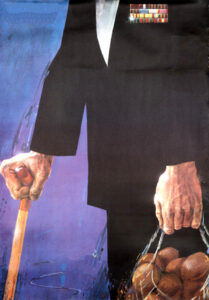
I felt great sadness for those of them and our allies who experienced such trauma.
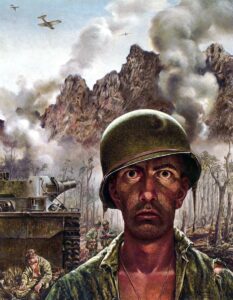
I felt great sadness for those of them and our allies who never returned.
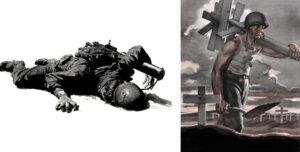
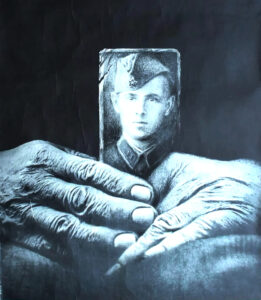
It was Leonard Cheshire the former ace pilot who put to me the proposition that nothing is worthwhile without a struggle.
While I can think of lots of things that would be worthwhile without one, for many nothing good comes easily. Nothing good comes without having to shoulder some heavy burdens. And that’s no lie.
Leonard joined the Royal Air Force when it was tasked with securing the sky above Britain. It’s pilots were held in the highest regard. They took to the air to take on the Luftwaffe while workers repaired the damage it caused below.
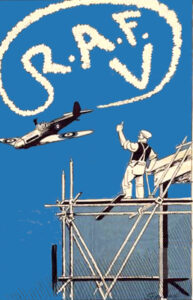
They carried out risky aerial reconnaissance over the Continent.
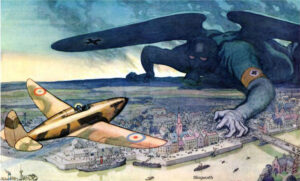
They carried out bombing operations against industrial sites and oil installations controlled by the Nazis.

They attacked German sites from the west while the Soviets attacked from the East.
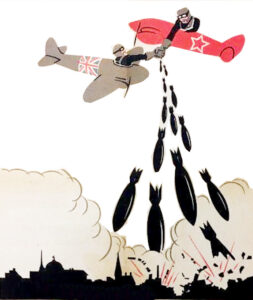
After being promoted to flying officer Leonard quickly rose to the top in the RAF.
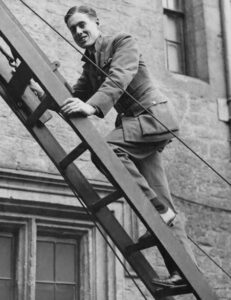
Defying probability, this magnificent man in his flying machine flew more than 100 strategic bombing missions over Europe. Hitting the mark, his valiant operations were the result of careful planning, brilliant execution, and supreme contempt for danger.
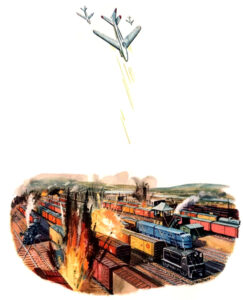
He perfected the strategy of dropping flares onto the target. This provided an easily seen visual aiming point for the following “main force” of bombers to aim at such as the roof of the Gnome et Rhône aero-engine factory which Cheshire dropped his marker on.
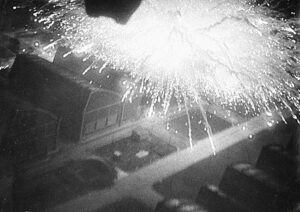
His was a profile in the kind of courage not many can even imagine. With enemy fighters flashing in, machine-guns shattering in violent flurries, explosions of flak flying over the targets, his Mustang plane would shudder as he dropped his deadly cargo.
Forced to fly lower, to fly farther, daring the elements, he challenged the gods and tested himself — overspent and fatigued — right up until death’s door.
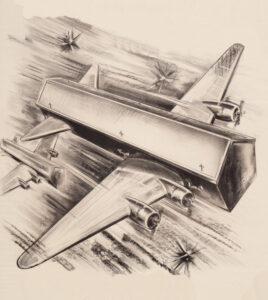
Forced to carry the hardships of “maximum effort” – he asked himself, how much can a man take?
At the same time those ordinary people living in a marauding country who felt the fury of stray bombs would have asked the same question.
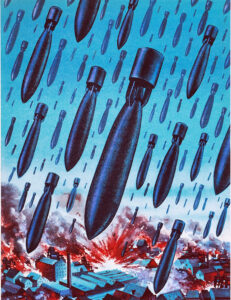
Dropping their loads at high altitudes because they wanted to escape anti-aircraft fire, these pilots couldn’t see see anything on the ground. They saw flashes, they saw explosions and could take pictures, but they couldn’t hear screams. They couldn’t see blood or severed limbs. They couldn’t see any of that.
An outstanding pathfinder and trusted pair of eyes, Leonard developed new low-level techniques that dramatically increased bombing accuracy. One occasion he flew his kite above a target obscured by clouds using a slow figure of 8 to act a guiding mark for the squadron. He demonstrated how in fighting you have to be totally focused and committed.
He observed the atomic destruction of Nagasaki.

Watching the mushroom cloud affected him deeply. Leonard described the blast as “clawing at the earth, swelling as if with its regurgitation of all the life that it had consumed”.
He later wrote: “At the moment I first saw it, it was like a ball of fire 3,000 feet high … a churning boiling bubbling cloud getting large and larger. I think if there was a first impression that I had, it was that you cannot fight this weapon. If your enemy has the weapon then you cannot fight it….”
He wrote: “Not even the enormity of the spectacle nor the certain knowledge that the war against Japan was over was enough to obliterate the horror at so vast an extermination”.
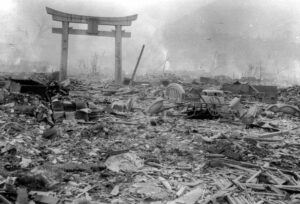
The enormity of what Leonard saw galvanized his view that nuclear weapons were a deterrent and were the way to maintain peace.
American bombers based in the UK regularly flew loaded with nuclear weapons.
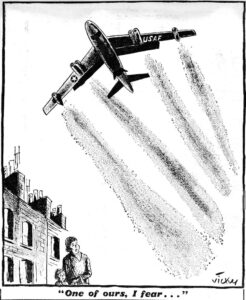
He felt that in the right hands, they were the only deterrent that would stop a third world war.
But are Donald Trump and Vladimir Putin who have raised the possibility of using them the ‘right hands’?
Regardless of his wishful thinking, the measure of this man is that after the war, he devoted himself not to a life of greater personal comfort or indulgence, but to helping the disabled.
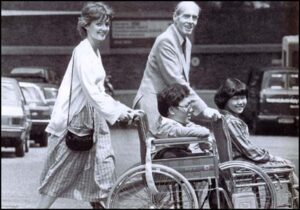
He applied the same gallantry and determination he displayed earlier—and straight shooting about his regrettably destructive role in total war for which fascism had left no alternative- to bring about greater understanding of the disabled, and to set up an international organization to serve us. In his finest hours he worked to bring us dignity and self respect, and to remind people of the consideration that ‘there for the grace of God go I’.
Ed McLachlan shows the modcons aging disabled pilots received enabling them to relive their memories.
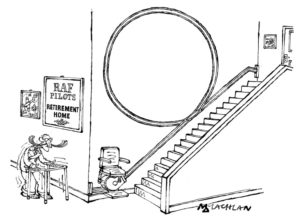
Leonard said “As I reflect on the years I have so far spent among disabled people, I see them as men and women who are in the forefront of our common struggle, just as in different ways were those amongst whom I served during the war. I find unique the example they set to rise above adversity, of how to forget what might have been and concentrate on making the most of what is left. I find we need that example if we are to stop taking so much for granted our good health and our many other blessings, and if we are to stop taking so seriously the little setbacks and the minor irritations of daily life”.
With so many planes on the runway Leonard’s world was ultimately thrown into a tailspin. His body was sabotaged by gremlins when he contracted motor neuron disease, many of the symptoms of which – such as paralysis – are along the lines of those of stroke survivors. This fighting angel appreciated my good wishes to him. A convert to Catholicism in which Christ’s suffering, sacrifice and austerity is a prominent theme, he endured his own tribulation with great spiritual fortitude. Roger Waters from the band Pink Floyd described him as ‘the only true Christian I’ve ever met!’
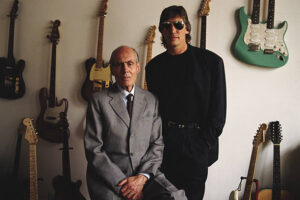
Leonard asked Roger to help him raise money for his Memorial Fund for Disaster Relief. Roger agreed and on July 21, 1990 staged a massive performance of the album ‘The Wall’ near the remains of the Berlin Wall.
Everyone should be inspired by the eloquent words coming from the pen of this man among men:
“We need a vision, a dream. The vision should be the oneness, the essential and organic solidarity of the human family. The dream, that we each in our own way make our personal contribution towards building unity and peace among us”.
Leonard Cheshire from his book – The Hidden World.
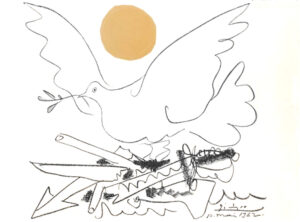
A Tough Guy with a Tender Heart,
Imbued with the same fighting spirit if not religious conviction was Burt Lancaster, the topflight actor who had sent me his warmest regards. I had looked up to him as a man who stands up for his principles both on and off the screen. He portrayed the kind of man men wanted to be, and the kind of man women wanted men to be.
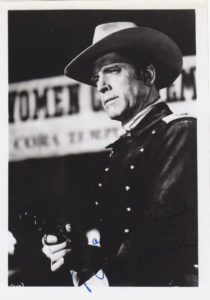
I had wished him good health, It nosedived when he had his stroke with similar effect aged 76. Withdrawing completely from public life, he spent the rest of his life in a wheelchair. The prognosis wasn’t good but Burt leavened his sensitivity with his gamely set jaw, that street wise toughness he had brought to his solid dramatic roles.
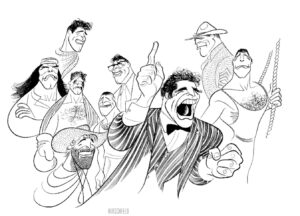
Even a stopped watch will give you the right time twice a day. Burt had grown up in those mean streets of urban USA where nobody gives you the time of day. Where something is happening all the time, mostly unsolved. This is the background of his film The Young ‘Savages.’
A boxing buff, he was a friend of Ezzard Charles, often considered the greatest light heavyweight boxer of all time.
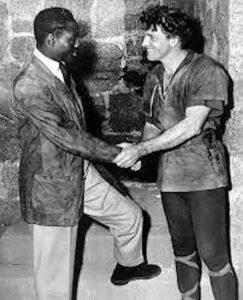
Having played the role of a boxer in ‘The Killers’, he knew the high of winning.
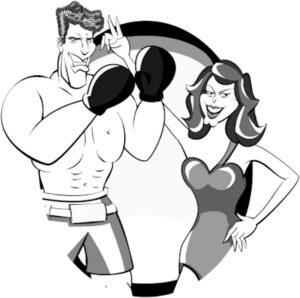
At the same time he knew the importance of refusing to stay down, to not end up out for the count.
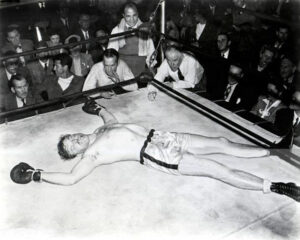
Burt was amongst other things a former circus acrobat. He had played this daredevil role in the film ‘Trapeze’.
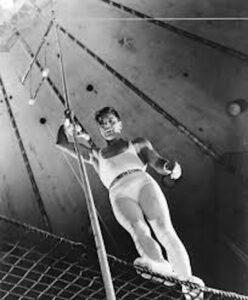
One of his demands when on location was to have a high bar set up so he could perform acrobatics and stay fighting fit. Allez oop, he wasn’t about to waste away in bed. He had both physical and speech therapy four or five days a week, his wife Susie said “because he wanted to get better and work. He was strong inside and out”. Director Sydney Pollack’s reflection on his visits to Burt after this, best sums up the actors fierce spirit: “The last time I left him, he doubled up his fist like a fighter’s. Then he shook his fist as if to say “I’m going to beat this. It was a heart attack in 1994 Burt would die from aged 80. He had had a quadruple bypass surgery in 1983 so his later years were an ongoing battle. I’m confronting mine with the same attitude and have the advantage of being younger than Burt without his foregone heart trouble. It’s a knife-edge high wire act keeping all of my six feet above the ground but I won’t go down the slippery slope without a fight. I’ll do my level best to stay in one piece.’
Stroke didn’t halt the comeback of Burt’s lifelong friend and co-star Kirk Douglas. He drew upon Burt’s example after a rocky start. In 1994 he made his first film since suffering his stroke four years earlier. Like me, feeling like one big palooka, he concluded ‘Why not finish off the job?’ It’s a logical question to cross one’s mind. Kirk questioned how he could be an actor and not be able to talk? Downcast, considering ending his life, he put his gun to his kisser and painfully knocked his teeth. Withdrawing the weapon he cracked up at his own dramatic gesture. Experiencing such relief vicariously helps us keep the black dog at bay.
I could weave all my loose ends into a noose. Thoughts of my transition have flashed through my mind when I make my way along the corridor leading to the gym at Balmain Hospital. There’s a break in the walled walkway where I could slide over the banister, go splat for a short cut to the mortuary. It’s the only place in my regime I know where I could wipe-out so confidently. I wouldn’t be able to get down to put my head in the oven even if I wanted, and my distaste for sleeping pills, which would be my frontrunner choice for an exit strategy, is on record. All of these ways out, especially the higgledy piggledy one, would leave amongst those who have helped so much to put Humpty together again the wrong memory of me. The Human Stain.
We have to avoid these tipping points, when the balance of judgement of life over death swings the other way. Fortunately I’m nowhere near that state yet. Still got my lust for life-touch wood! I probably could never commit suicide even if my life depended on it.
If I ever do my favoured point of departure would be that of Remy, the diehard, unreconstructed socialist in the film ‘The Barbarian Invasions’. After enduring the bureaucratic absurdities of the run-down overstretched Quebecois public hospital system he rooted for so strenuously, this erstwhile philanderer riddled by terminal cancer finds final release in the embrace of his family and fast friends in the lakeside retreat he so loved, sent off with his one and only, first and final medically administered hit of heroin. I hope I never have to grapple with such a decision, never ‘surviving’ like Ariel Sharon.
We have to talk freely with family and friends about this, the weightiest of questions. This is the only way to shoot off our mouths.
Kirk’s film ‘Diamonds’ tells the story of an ageing boxer who suffered a stroke but insists on going on a treasure hunt with his son and grandson. “This picture is part of me”, said Kirk whose stroke affected his ability to speak. “I think his biggest fear was that people would not understand him”, said the films producer Patricia T. Green. Kirk spoke of the rehabilitative property of working on the film: “Never give up”, he said. “Acting helped encourage me to keep working and improving my speech. Your brain can sort of atrophy. You have to use your brains and your muscles, and then I did a movie. I am working at my trade”.
As is Jean-Paul Belmondo, adored by fans as an athlete who did most of his own stunts in his action-packed films. Sharing some of Kirk’s post-stroke symptoms, he has stoically shed the image of the charming gangster and cocky seducer he played in films decades ago insisting on his last-‘A Man And His Dog.’- show him as the old, disabled man that he is now.
“It’s me,” he said of his new image, “without any special effects.”
Reportedly asked how old he felt, he replied, ‘I’m only as old as the woman I feel.’
To prove he hasn’t lost his old touch, he showed all cock a hoop he could pull off yet another cunning stunt. A 33-year-old, raven-haired, tanned Italian in hoop earrings and a low-cut strapless dress.
Ready, Willing and Disabled
A serious stroke in 1974 left the artist and shutterbug Cecil Beaton unable to use his right hand.
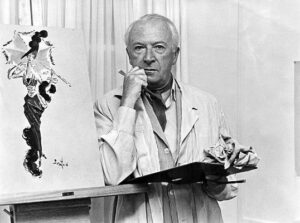
A decade earlier I had wished him continuing success in his clever, inventive work .
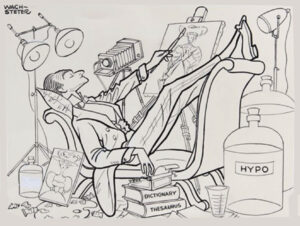
It made him happy to know his work had given me pleasure.
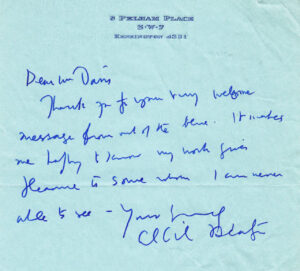
Nevertheless after his stroke he began to paint and operate his photography equipment again using his left hand. Some of his left handed paintings – were remarkably successful. When, in the spring of 1979 the Paris couture collections proclaimed a “return to elegance”, it was naturally to this visually intelligent that French ‘Vogue ‘turned.
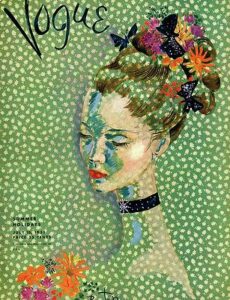
His images had helped to define the look and feel of the late 1920s and 1930s. Beaton re-evoked the mood and style of his fashion photographs of the this period with delicately fragile poses of society beauties, as if they were made of porcelain.

From his unique insider’s perch he had captured the widest range of images throughout the decades .
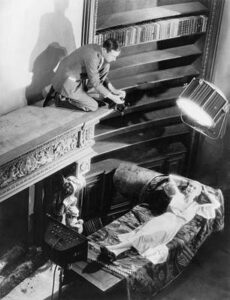
The figures he engaged with highly stylised poses and shadows reminiscent of German Expressionism.
He depicted high society figures.
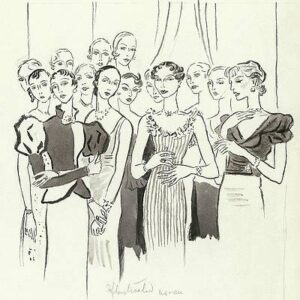
He portrayed Hollywood icons such as Marlon and Marilyn.
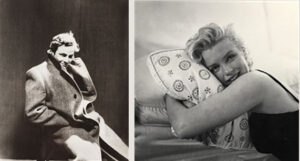
Women such as Vivien Leigh and Marlene Dietrich served as his models.
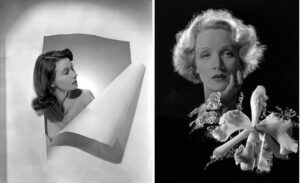
His self portrait artwork represented the whole artist—in other words, how he saw himself, what he was feeling, and how he wanted to be seen by others.
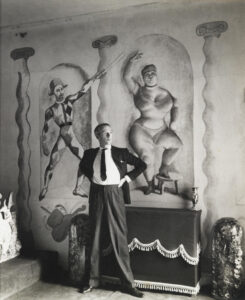
He developed a style of portraiture in which the sitter became merely one element of an overall decorative pattern, which was dominated by backgrounds made of unusual materials such as aluminium foil or papier-mâché. The results, which combined art and artifice, were alternately exquisite, exotic, or bizarre, but always chic.
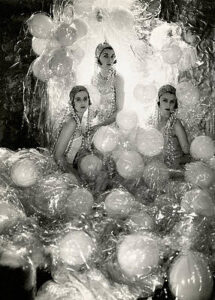
He was one of the first to raise the role of portrait photographer from a man with a black cloth who entered by the tradesman’s entrance to a man who was asked to stay to lunch.
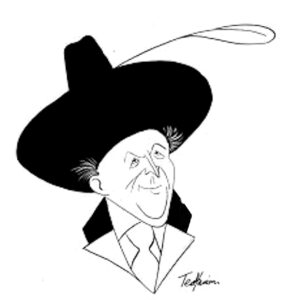
When Cecil ‘the great retoucher’ snapped the Queen, she was in her crown, on her throne, regal chin up. None of this one off contemporary casual business he would engage in with Jagger and Richards.
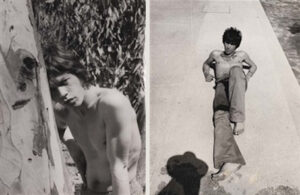
He understood the public’s desire to see the figures they so adored in all weathers and lights, in roles other than those that made them famous.
‘The great retoucher’ made them look stunning. He examined his sitters with a cruel eye and disguised their faults by subtle posing and lighting.
Some of the most fascinating photographs he took were during a visit he made in 1944 to parts of China controlled by the Kuomintang.
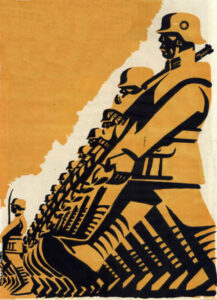
As for me, while a child, armed with a Box Brownie I would document and interpret my own characters and surroundings whenever a memorable candid situation presented itself or fancy struck. I wanted to develop an excellent eye like Cecil’s, utilising the general rules of composition, one which didn’t rely on technical knowledge.
Using my stance as a tripod, selecting the subject through line-of-sight, I then steadied the shot on a down breath. I don’t remember much of the technical details as one had little control over taking the image. Sharp images were hit and miss. In truth, I’d say my career as a photographer was a bit of a blur. I had thoughts of becoming a professional photographer, but nothing ever developed
As I did as a lad, he too had made model theatres in shoe boxes, manipulating stick figures for his own shows. creating in miniature what he wanted to have in reality. He designed scenery and costumes for many ballets, operatic, theatrical and film productions including ‘Gigi’ and ‘My Fair Lady’.
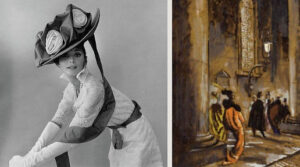
Caught out, belly up, holding no currency, frayed around the edges, I envy the economic leeway of talented people such as Burt and Cecil based on their past achievements. Unlike Burt I don’t have much of a safety net to cushion my fall. Unlike Cecil I am not one iota ‘well’ connected. I am hamstrung because of the nature of the work I have undertaken. In education I never produced great financial return, this profession having a large altruistic component. With this territory comes the chance to pursue loftier dreams–those of achieving social harmony and tolerance. And with it came for me lots of good copy.
I ended spreading myself very widely over all academic areas as a result of teaching in NSW state schools. As a freelance educational troubleshooter, my raison d’etre, I created resources on an ambitious scale that satisfy a strong community need. But marketing these – difficult as it was working self employed and mobile – has proved impossible since I can’t manipulate my material or move my wares around and show them to people. This has put paid to my chances of being paid in the manner I had expected.
Losing my competitive edge, Lady Luck passes me by. Without the fruit at the end, I have ended up out on a limb. How to limber up? How to pull myself up by my bootstraps when I can hardly reach them? How to pack up my troubles when I can’t reach my old kit bag? How to wriggle out of this static sticky wicket without wiggle room? How to bow out gracefully when I can’t bow?
Write On.
‘Happiness is beneficial for the body, but it is grief that develops the powers of the mind.’
Marcel Proust
‘The raw material of my work lies between reality and nostalgia.’
Gabriel Garcia Marquez.
Having confronted hitherto unknown expectations, rejections, hopes and disillusionments, I have crossed abruptly over that thin line between adulthood and old age. And once over that threshold, nothing is like it was before. I had travelled on the ‘live now, pay later’ scheme: ‘Adventure before dementia.’
I started out in life with nothing and I still have most of it. At the time of the attack I had enough ready money to last me the rest of my life… unless I had to buy something. I was a fiscal failure. My extensive frozen assets consisted of two packets of chicken drumsticks and a carton of cooked lentils. Now when it comes to buying meals outside, the restaurateurs insist I pay upfront.
Caught short, flat busted, I had no nest egg set aside, all my earlier ones having been cracked in the one basket.
The only thing I had set aside for a rainy day was my umbrella.
Racking my brain, what plan can Rip Van Winkle hatch up now after awakening? Now I see things as they are, forced to concede the extent of my injury, I need a new approach into which I can lean. I have to adjust my sights one last time. Having lost totally the world of paper I lived and worked in, this revenant now had to enter the completely new virtual digital age. In future shock, feeling time and tide rocket past me, my golden chances pass me by, I’m determined, if I’m going through the wringer to squeeze out every last drop of life from this spent frame. This old cat’s got one life left. In one last fling, I’m reliant on my only useful ability left. For the life of me, by a process of elimination, I can’t see further reprieve other than through good old time honoured story telling. Following that impulse within us that makes us want to explain ourselves to other human beings
The same impulse that drove the late, great Professor Hawking. Like many other similarly or nearly as similarly handicapped people he brought out the point that it’s not quite right to talk about his doing all he did in spite of his illness. This was only partly the case.. If you read some of his writing about the time when he was just beginning to deal with it, he says himself, “Everything I have done since then, I would probably not have done had I not had this illness.’
What story could I come up with?’ I asked myself.
‘What’s your angle?’ you might ask me.
‘It’s like this’ I reply. ‘To buy time.’
Just as as it did for Scheherazade, her life spared day by day by the sultan, hanging on her every word, eagerly anticipating more of her story. Unlike her, I can’t do this sitting cross legged. It buys time for me just as it did for the greatest Indonesian writer, Pramoedya, exiled for three thousand and one nights. A wonderful raconteur, he fought against cruelty, disease and creeping insanity by telling true stories to his fellow prisoners, stretching them a little bit to make them a bit more interesting for people.. It kept hope alive for him and them. As they listened, their heads tilted to one side, the prisoners momentarily forgot their fate.
As it was—if ever so briefly — for Jean-Dominique Bauby who pinned his hopes on his short bestselling book ‘The Diving Bell and The Butterfly ‘forming the basis of the astounding movie of the same name.. Unlike Isaac Asimov who said he’d type faster if he had only six months to live, J. D. couldn’t type, even if his life depended on it.
His massive stroke left him unable to move anything but his left eye. Making a virtue of necessity, he dictated the story by blinking while a secretary ran through the alphabet. Immensely inspired by Jean—Dominique, I’m aiming for a one hit wonder like his – hopefully pre-humously –rather than post. A case of publish and/or perish. I can blink both severely stinging, astigmatic, cataracted eyes, stagger to the computer and, working and reworking, hunting and pecking singlehandedly cobble together a killer, no filler, never ending story with many moving parts. It’s shift work. If I had nine of my fingers missing, I wouldn’t type any slower.
Words are the only things I’ve got going for me. I put it to you that if, bolstered by a way with them, a nifty turn of phrase, multiple historical grace notes, and some running gags, imagine the kind of runaway success, the kind of breakout smash hit I can expect to chalk up. Not to mention silk dressing gowns and interviews by appointment. Imagine the kind of writer I can expect to become. Famous in comparison to the anonymous. Important in comparison to the overlooked. Wealthy in comparison to the poor. Brilliant in comparison to the moderately intelligent.
Of course Jean-Dominique’s coinage as an editor in the publishing industry held him in good stead. Then again I am under the auspices of a good woman – Leonor, who encouraged me to write as a therapy, as an outlet for my feelings and ideas. In doing so I bring everything I’ve been through into the end product, including packs of dogs.
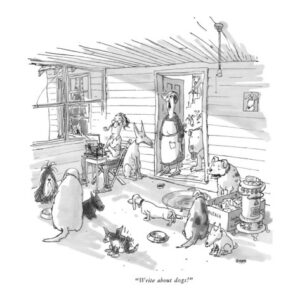
My mind still concentrated if not wonderfully, with a new slant on things, with the benefit of hindsight, I have to take advantage of my condition, take stock of myself, assess and appreciate my life, come from nowhere and peak immediately as did ultimately Alan Sillitoe with his first novel. Slow and unsteady wins the race. Alan took up writing while recuperating from a debilitating bout of tuberculosis when serving with the RAF in Malaya which left him not up to much for anything else apart from writing. Alan wished me the best of luck. Having lived to tell my taut tale, I need this salve now more than ever. Hopefully some of his well turned invention and skill – his lifeforce – rub off on me. I already have the trappings of a tortured yet dogged reclusive writer in his elegaic anecdotage, holed up in my book sanctuary, crammed with books at the outset. A ghost writer in a residence if you may, a rarity in these days of increasing shortages of homes for for all kinds of artists especially. A man writing from within, drawing on his many first-hand experiences, the highs and the lows-the flickering candle. A belated baleen writer, trawling back through the years, I’m totally wired. That antenna is always out there. Filtering out words from the air and the slick glowing sheen of my mainstay screens, I listen and read for ideas and experiences that correspond to mine, for language that best expresses it, and reject that which doesn’t. A could-be reaching for a star, or at least a has-been, better than a might- have- been by far, for a might-have been has never been, I tease out their meaning and plough in my predigested education mish-mash. Down the hatch to dissect, blend and digest fully this eclectic hotch potch.
Reconstituting the lot, jogging my trace memories, triggering a kaleidoscope of flashbacks. Piecing together my condensed reminiscences of both high points and seemingly mundane moments. Blending high and low politics with accounts of the ebb and flow of everyday life, of friends, relatives, aches and pains, chance encounters, street life and the weather.
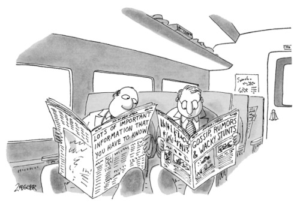
Containing something unknown yet familiar, finding the extra in the ordinary, the uncommon in the commonplace and the exceptional in the unexceptional. Finding the incidents in the mundane, making boredom and disappointment engrossing rather than churlish, revealing to people things they knew but did not know they knew. In the spirit of the truth, fleshing out the bare bones of my tale, grafting elements of various genres, laced liberally with references reverential
I’ll send an SOS to the world
I hope that someone gets my
Message in a bottle.’
The Police
Yes, the past is another country. Plugged in, reconstructing my course in life, I’ve become aware how frail and distorting memory can be through the mists of time. Memory is very fallible and selective, especially over seventy years or more. Reconnecting to a time and place that has vanished with astonishing haste, it is easy in good faith to confuse once incident with another, one night with another, one person with another. Memory can be a tricky thing because, after a few years, the mind can mentally conflate one’s own footage with that cranked out by those behind the cameras, merge two incidents into a better story. Sometimes you have to shave a little off the puzzle piece just to make it fit.
Like rebuilding an ancient ruin, the resulting construct can be aesthetically becoming but not dead-on. Like creating amateur sculpture, I bash away at the calcified past with every sharp tool I can muster, removing any undesirable accretions, taking away any unnecessary placements, making any necessary adjustments, applying the finishing touches, restoring the original, peering around to examine hard-rock indents from different angles, moving away afterwards to wonder the meaning.
It appears the older I get, the better I used to be.
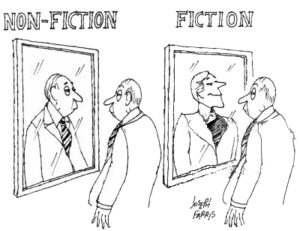
When checking clear impressions against actual writings and photographs, I have found some long-treasured images in my magpie mind quite different from the facts. Who wouldn’t scratch their head trying to remember exactly what they and others spoke a half century earlier? Eyewitness accounts of crimes that are only hours old can be regarded in the legal system as unreliable—so, fifty years? Or sixty? I believe I’m entitled to put in quotation marks and have myself saying things along the lines of what I actually said. This must include some things that I wish I’d said at the time if I’d been wittier or quicker on my feet.
How does any fictional component tally with my actual life in order to ring true?
There are only two sources of inspiration for a writer-close observation and analysis of the life around them or their imagination which may be the repository of other writers’ work lodged in our deep unconscious.
I check what I’m writing against my experience and my analysis of that experience.
The way I write is to check out reality as opposed to the so called powers of my imagination which are probably mimicking someone else anyway.
We’re plagiarising everybody all the time.
We’re plagiarising Shakespeare every time we open our mouths practically.
Our language grows by what other writers have done previously.
It is after all the highest form of flattery.
The important thing is it’s not where you take things from – it’s where you take things to. It’s how you repurpose and what you add to it.
You might be forgiven for reading my story and thinking, ‘This guy borrows so freely, his story a reminder of so many others, that it’s a little startling after a while to realize how effective it is and how original it manages to feel despite what I see as the plundering and recycling.’
Some might accuse me of ‘plagiarism’. It’s their word not mine.
Some might accuse me of shameless self promotion.
Who me? [email protected]
I recommend you approach my story as a work of fiction so as to avoid any sense of disappointing disbelief. Then if you check it’s veracity, you’ll agree that it’s factualism is just as strange or otherwise as fiction. Judge it as it stands.
We do see our lives as a story. It’s something instinctual, something human. Of course, its not true. Life is not like a story. It’s full of unresolved mysteries, many loose ends and lack of closure. However we perceive it as a story and construct it as one. We can’t go back to the past but we can consider it from a new perspective. When we write our story we give life to fantasies and imagination. When we remember the past we change it unconsciously, we manipulate it. Between the literary and the literal, biography is an invention. Life does not have that pattern but we need a pattern. We connect the dots.

Bearing this this in mind, keep in mind that this is a story based on my life and times. Grounded in documentation of my whereabouts and personal exchanges, it aims to give a credible impression of me and and my place in the world. It is inspired by the truth of what things that may well have happened felt like at the time I am writing about. I aim to write about them in such fidelity to the way people do behave that the reader gets all the more involved in the story. He or she halfway believes they could really have happened. They can judge how likely they were, what was probable, what was extremely improbable and what was completely out-of-kilter with real life. Even if the reader feels this is the case, then what they reveal about me would be just as much as if they were made up. The perspicacious reader is left to draw her or his conclusions from what is presented to them. It is up to to him or her to decide where exactly this story and its characters live in the disputed territory around truth, untruth, near-truth: the comforting fiction that we all create around what we remember of our lives.
The story does not demand to be read according to how far from a presumed dividing line – a line separating certain forms and the expectations they engender – it is assumed to stand. Stone by stone, bone by bone, very close to the reality in parts- some memories are fixed absolutely in time – and others are fleshed out more loosely, interpreted more fancifully. embroidered with grace notes and dressed up in various degrees for interpretative dramatic and comedic purposes. I take the truth and embellish it with a little curlicue at the end.
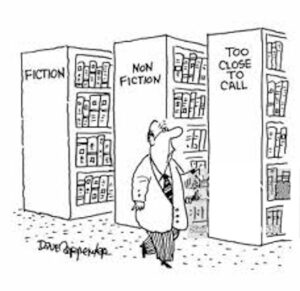
I feel I can ‘sex it up’ like this if it really makes no difference except to the aesthetic experience of the story. These and these only are the liberties I have taken. The names of those explicitly identified have not been changed . The dialogue and actions are aimed at being at being verisimilitudinous, at being genuine to the characters and consistent with the events. As a point of honour few come out of what I write looking worse than me. That eliminates a whole area of grievances.
It’s an open ended story. Like the educational program I constructed, it allows for future changes, revisions and additions. It is broad, wide ranging, unrestricted, continuing and without fixed limits. It’s adaptable to the changing needs of the situation. It expands in any number of directions, creating a complex and meaningful story.
It does have a clear cut ending in one respect. My ending as a human being. But then comes the future of my constituent parts.
While it’s veracity will hold up under challenge, it’s a story to which I’m very much indebted to others too numerous to cite-others whose lives have paralleled mine in parts, whose writings and art I have drawn upon and sampled liberally because of my handicap. Looking at the world through their eyes as well as my own I pay homage to them for widening my perspective. In this age of cut and paste, of shamelessly lifting from that vast derivative cheat-sheet called the internet, of having one’s story virtually write itself, the footprints of others are probably as much all over my story as mine are over others. We share respective collective pasts and terrifying current national states of affair. In some cases I cannot know the difference from their contributions and mine and could never excise them even if I wanted. Of course there’s no such thing as an ‘old story’ only a story you haven’t heard yet.
It needs a disclaimer in the front no more than the Bible which one could argue needs one saying ‘This is fiction.’ I mean, walking on water? It takes… an act of faith. Readers are clever enough and bright enough to separate out fact and fiction.
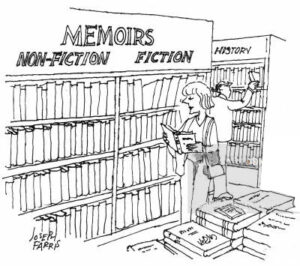
This is not an academic exercise, nor one in which I seek self-aggrandisement, nor to steal anyone else’s thunder. It is, in a manner of speaking, a story of survival. If I’m to be judged, it’s as a teacher manqué, from a system you’ll know from the horse and dray.
This is an epic, not in the familiar swords-and-sandals sense of Ben Hur, but in the classical, poetic sense of the term. It relates to a tale in which the main character undertakes a journey, faces diverse situations and characters; and, learning from his experiences, achieves a new worldview and comes to some moral revelation along the way.
It is realist according to the Brechtian directive: ‘Realism is not a matter of showing real things, but of showing how things really are.’
Now for this literary late bloomer, johnny-come-lately catcher in the wry to come up with the goods, painting my way out of this corner with a vast spellbinding canvas of varied texture, laid out in broad strokes. A portrait of the experientially short period of my existence, shots and slices evoking an acute sense of time and space, uncoiling the narrative spring, with oodles of oomph and a fresh spin.
As for uploading the never ending story, up ’til 2020 I’ve placed two thirds of it online and counting.
Every time I download , I realise how much I’ve chewed off, how much more I need to upload. I realise how much I need to move through to polish it through a method of delivery the Bard could never have imagined.
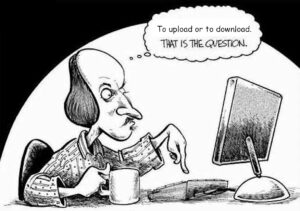
A worthwhile convincing saga, not just another overripe one that’s been done to death already. Rising above the pedestrian, standing on it’s own, lots of kick, abuzz with words leaping from the text. A weighty page-turning yarn leavened with displays of ironic wit, erudition, painterly precision and engaging punchy, snappy badinage that doesn’t fall flat. Making you want to read fast so you can find out what will happen and making you want to go slow so as to relish the writing. One that finds the balance between tension and humour. As ripping and involving as that of Robert Evans, who, floored by his stroke, assured his company ‘There’s never a dull moment around here.’
Touching the Right Chord
Courage is to look for truth, and to speak it out. Courage is understanding one’s own life, deepening it, making it more precise and grounded, while synchronising it with life at large. Courage is moving towards the ideal while understanding the real.
Jean Jaures
Having thus far aroused, drawn you in and held your interest in such banal horror and pep talk, I, this shadow, now invite you to look on as I put myself back in my former self. On my changing fortunes in this unfolding saga leading to my folding up. From go to woe, from ‘goo’ to ‘whoa’, from bundle of joy to bundle of pain, from just for kicks to kicks in the shins, from Baby Boom to Bust- and Beyond- in a stream of consciousness embracing intimately observed events all in a flow.
To make a long story short, I recount my life so far, tracing back the course of my wondrous odyssey and the pivotal events thereof. The tracks I, metaphor Man, went along: the beaten, the less trodden, the side one I was driven into and that which I stopped dead in. The trails I followed blazed by the host of luminaries I earned the attention of: around the antipodes and in between, through the mill, the big end of town and the barricaded neighbourhoods; over burning bridges, over thin ice, past the writing on the wall. The waters flowing on my way: the smooth and the troubled, the deep and the back, those under the bridge, and those I cast bread upon. Going overboard for love, missing the bourgeois boat, paddling my own canoe, swimming against the tide, being sold down the rivers, crossing the Rubicon, ending up the proverbial creek, stranded high and dry.
I’m confident the reader will excuse this indulgent display of figurative comparison. As a would be Neil Simon, I know ‘a writer without confidence is like a metaphor without something to compare itself to.
I am focusing on this activity with the same assiduity as Jacob Wepfer, who wrote about the brains he picked at the University of Padua in the 17th Century. While dissecting corpses there in the morgue he linked the mystery of stroke to the observable disruption to the blood supply.
I am focusing on the meaningful events and people in my life. I concentrate on how I came to be involved with these events and communicate with those in prominent roles. Players in the front seat through whose eyes I came to navigate the cultural and political roadmap of the 20th Century, a period that has passed forever. Bit players and backroom boys, those working behind the scenes with whom I I exchanged words and had dealings. The good, the bad and the beautiful. Sharing with me events, stories, hopes, and fears about our lives, marriages, and children. Steering me clear of the many obstacles in life’s course. Or setting them up. In literary cameos, identities whose lives interweave seamlessly with each other and mine, both fleetingly and deeply, to form an intricate social fabric.
By picking the brains of these artists and political figures, by relating their experiences to my own and to each others, I absorbed and processed their ideas. Acting as signposts, theirs’ informed my own. Unless I indicate otherwise; the ideas registered in these bumper pages are ones with which I am without fear of contradiction . I experienced imaginatively what this cast of memorable characters had gone through. Success. Failure. Loyalty. Betrayal. Pain. Pleasure. Full-blown war.
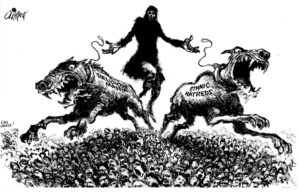
Cold War. In particular the fear that was engendered in this protracted standoff. In my confessional I consider how this complex crippled relations between my country and others, between people in my country, especially teachers and others, and between members of my parental family. How it enabled Big Brother and Big Sister to selling me short-persona non grata- and renouncing me so peremptorily for my prescience, declining a battle of wits, settling for a high stakes drawn out withering double whammy. Getting away with covering up matters of grave concern I raised, damming up my slow burning outrage, playing me like a grand piano, helping me lay the wallwork for the premature bloody breach. In this retrospective I aim to level with the reader, delving into the underlying forces affecting my outlook and and actions and those of others towards me.
The title for this book “In Letter and in Spirit”, has a double meaning. It takes account of both the snail mail variety of lively letter in longhand that features in my story and the expression itself. In the expression ‘Letter’ refers to the building blocks making up the words that spell out our responsibility as members of a specific social grouping or of society at large to carry out our required role. The expression refers to us not just going through the workmanlike motions of fulfilling our role, doing it not perfunctorily, not as a matter of course, but rather with dedication, fervour and of our own accord. Doing it with our all- not merely because it’s the thing to do, but because we believe in it and want to. Giving of ourselves to the best of our ability. To the highest standard. Acting more than agreeably to the fitness of things. Paying more than lip service. Above and beyond the call of duty. Serving a higher purpose. Part of a greater plan.
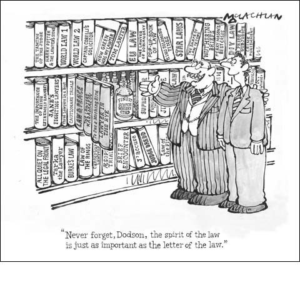 In profiling myself, members of my generation and those of my parents’, I raise this as a matter for consideration.
In profiling myself, members of my generation and those of my parents’, I raise this as a matter for consideration.
The first person I remember hearing use it was none other than good ol’ George W. Bush, who stated that under his watch the U.S. was respecting the rights of its political prisoners according to the Geneva Conventions both in ‘spirit and letter’ (sic). Readers can judge for themselves the sincerity of his extra-ordinary rendition.
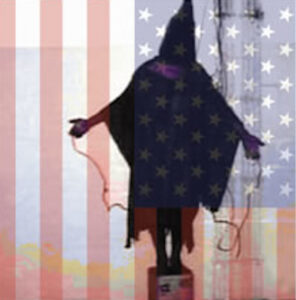
I want those who read what I write to appreciate it as did those with whom I corresponded.
They provided me with a literary entrée into the world they occupied, offering appetisers that will entrance readers, leaving them wanting more courses.
Foremost amongst those who appreciated my writing to them was Andre Chamson.
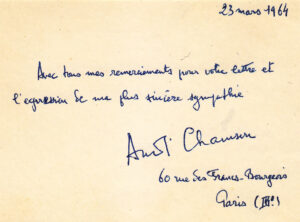
He was Director General of French Archives and International President of the PEN, the writers association. I thanked this writer for his fight with republican partisans fighting Franco, and his highly decorated involvement in the French Resistance during the German occupation. He was all too aware of the Nazi and Vichy policy of ill-treating and isolating writers they considered subversive,
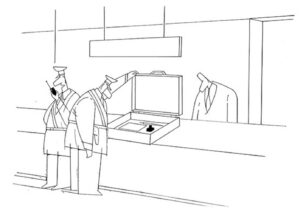
Andre saw the writer as a socially committed person who strives for the highest ideals. I encouraged him through his association to lobby successfully for the freeing of political prisoners such as the Indonesian writer Pramoedya Aranta Toer – persecuted in the years after the Japanese occupation.
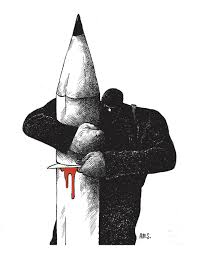
I want readers to appreciate my writing as have those who read the bluechip education material I compiled. A limited readership, it was part of a service directed to the widest range of abilities, including semi-literates. Now with a product, I’m aiming to attract a narrower, but more global literary readership. For the older reader, the various themed episodes will be reminiscent of the past. For younger readers they will help to develop a greater understanding of the cultural heritage we all share. Now after some convulsive side splitting to get weaving!
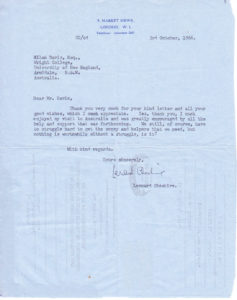
Hello. This is Dietrich